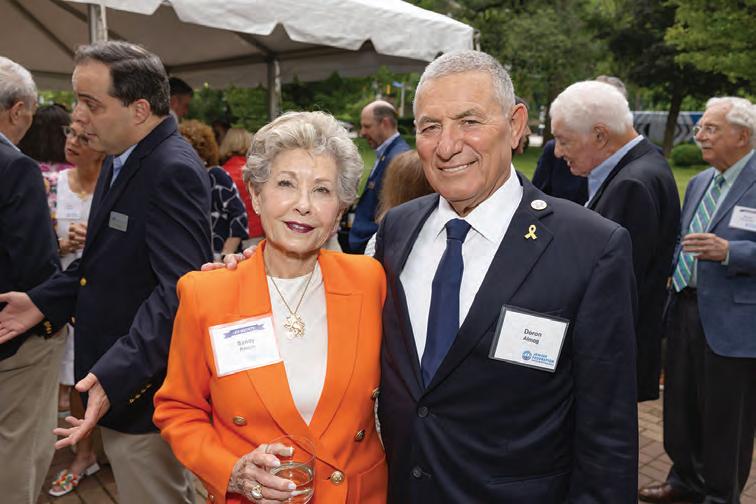

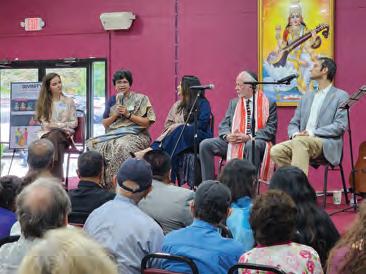





By David Rullo | Senior Sta Writer
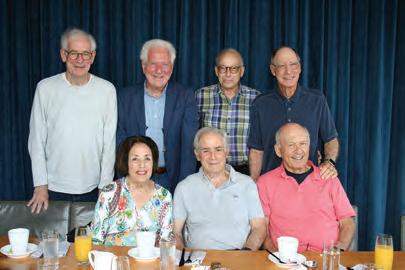


Edward Arthur Owens Jr. must remain in prison while awaiting trial on federal charges of “transmitting in interstate or foreign commerce” a message “containing a threat to injure the person of another,” pursuant to a judge’s June 5 order.
Owens, 29, of Elizabeth, Pennsylvania, appeared before U.S. Magistrate Judge Maureen P. Kelly, who agreed with Assistant U.S. Attorney Carl Spindler that public safety could not be guaranteed if Owens was granted monitored release into the custody of his mother, Wendy Burtner-Owens .
The detention hearing was held after the defendant waived his right to a probable cause pretrial hearing.
At the hearing, FBI Special Agent Abigail Patcher testified that on May 20, 2025, Owens sent a threatening message by Facebook to a Pittsburgh public official, whose identity is being withheld out of concern for their safety.
“We’re coming for you [emoji of person raising right hand] [German flag emoji] be afraid. Go back to Israel or better yet, exterminate yourself and save us the trouble. 109 countries for a reason. We will not stop until your kind is nonexistent,” Owens wrote using the alias Casey Jones.
The number 109 is based on an antisemitic conspiracy theory that Jews have been expelled from 109 countries.
Patcher detailed for the court a list of

antisemitic and conspiratorial statements made by Owens and cataloged several alleged lies he told FBI agents while they investigated the threats.
Among the litany of antisemitic statements the FBI found on the defendant’s phone included that Jews control the media and run the world, that Adolf Hitler did nothing wrong and that the United States should have supported Germany during World War II.
Owens expressed frustration with United States support of Israel in its war against Hamas, saying that he didn’t have health insurance but the U.S. was sending $5 billion to Israel.
The defendant, Patcher said, searched the internet for New York City synagogues as well as the phrase, “dancing Jews,” a reference to the conspiracy theory that five Israeli men were seen dancing in the streets of New York in the wake of Al Qaeda’s 9/11 attack on the World Trade Center, and were arrested and later released without being charged.
The defendant’s vitriol wasn’t only directed at the Jewish community, though. He also wrote with anger about Blacks, Christians and Muslims.
“F--- Palestine,” “F--- Lebanon,” “F--Yemen,” he wrote.
Perhaps most chilling were the revelations that Owens searched and read several of the same distorted Talmud verses as the Pittsburgh synagogue shooter, who killed 11 Jews in the
haryn Henry was eager to show off the room where she would be speaking to the Chronicle during her final interview as a rabbi of Rodef Shalom Congregation.
Formerly the senior rabbi’s office, the large, comfortable space was filled with books, seats to lounge, good lighting and a beverage station. Henry had taken the initiative in transforming the room from one that served a single individual into one that is welcoming and accessible to anyone in the congregation who wants to use it.
That’s clearly been a theme of Henry’s rabbinate: Making space for others.
Henry, who has been a rabbi at Rodef Shalom since 2004, will be retiring at the end of the month, marking the end of a career that has focused on improving the lives of her congregants. She served as a rabbi with Senior Rabbis Marc N. Staitman, then Aaron Bisno, but she began her tenure at the Reform congregation in 1999 as the religious school principal, then the youth and education director. Before joining Rodef Shalom, she was a rabbi and educator at Temple Ohav Shalom in Allison Park.
And before she came to the Pittsburgh area, she was the assistant rabbi at The Temple, Congregation B’nai Jehudah in Overland Park, Kansas, and the first full-time female rabbi in Kansas City.
If life had gone slightly differently, Henry may not have ended up in the rabbinate. When she was 23, and living in Columbus,




8
By David Rullo | Senior Staff Writer
Doron Almog’s life can be seen in three acts.
Almog — who was in Pittsburgh last week to speak at the Jewish Federation of Greater Pittsburgh’s Heart of Philanthropy event — is chairman of the executive of the Jewish Agency for Israel, the world’s largest Jewish nonprofit.
That position, though, is the last act of a three-act work that Almog says began with his time in the Israel Defense Forces. A retired IDF major general, he served in the IDF for more than three decades.
His service, Almog explained, is dedicated to his brother who died defending Israel.
“He was left behind in the Yom Kippur War,” Almog said. “He was shot by a Syrian tank and waited seven days near his burning tank. I’m still frustrated that I didn’t fight with him and couldn’t evacuate him.”
Almog’s second act began 11 years after the Yom Kippur War, when his second child, Eran, who had autism and Castleman’s syndrome, died at the age of 23.
“He never said a word. Never said ‘abba,’ never made eye contact,” Almog said.
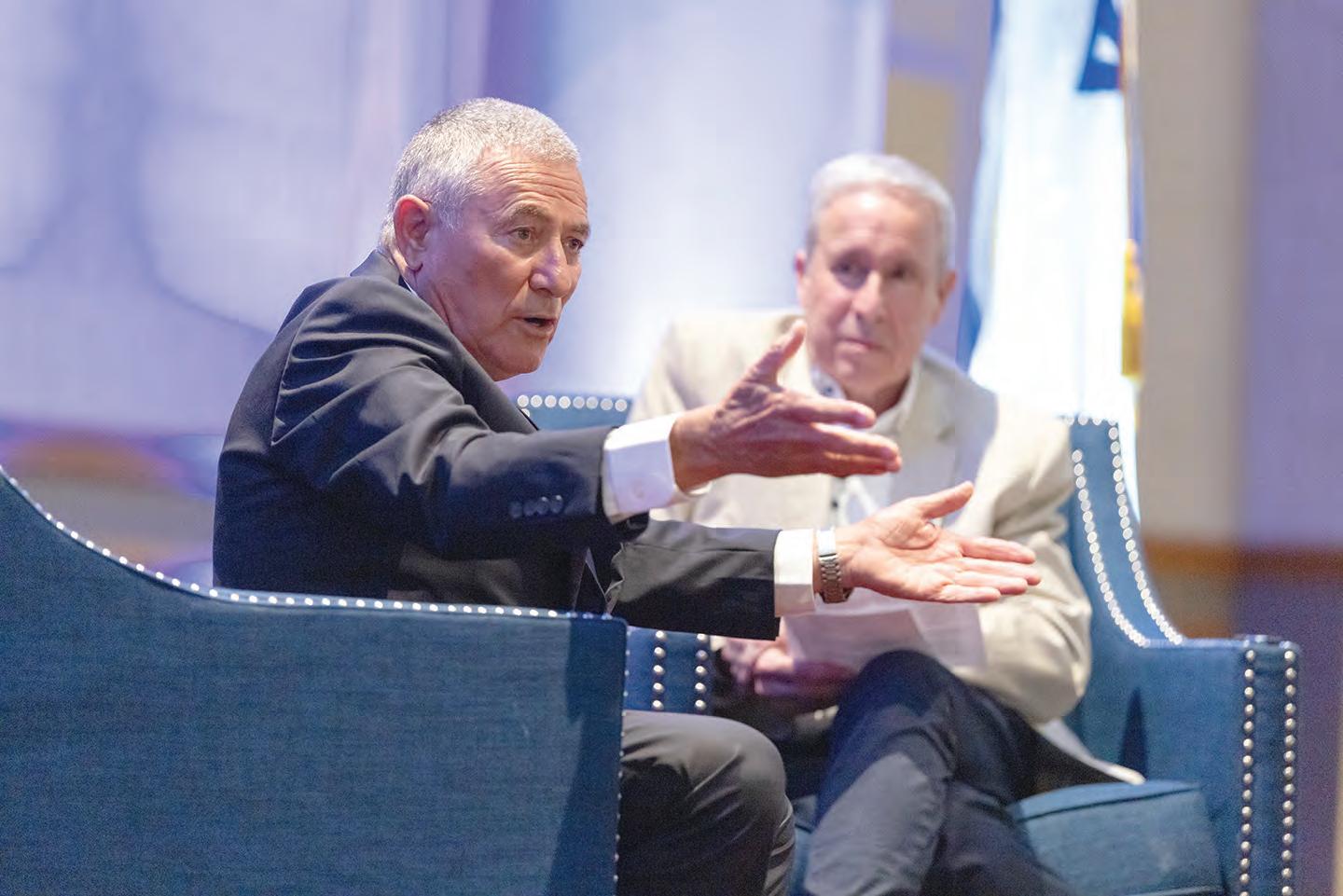
Eran’s suffering, Almog said, made him think about what it meant to be disabled and fully dependent on other people.
In 2005, Almog founded the Adi NegevNahalat Eran, a residential and outpatient rehabilitation center for children, teens and young adults with severe disabilities. The center was the first in the Negev and is a pioneer in opportunities for Israeli youth with intellectual and developmental disabilities.
The facility, Almog said, not only houses
about 170 children but has taken in about 1,000 people from the south of Israel, many of them injured and traumatized following Hamas’ invasion on Oct. 7.
“We built hospitals with a rehabilitation and orthopedic departments and special treatment for people in trauma, mental trauma,” he said.
The lessons Almog learned from Eran, he said, not only taught him the meaning of
love in the world but also what it means to be Jewish, living in the Diaspora for 2,000 years, suffering from antisemitism and stigmatization.
In 2016, Almog was awarded the Israel Prize for his lifetime of achievement and in 2022 he was selected to run the Jewish Agency for Israel, which he said, was the beginning of the third act of his life, “dedicated to the Jewish people.”

SUBSCRIPTIONS
subscriptions@pittsburghjewishchronicle.org 412-687-1000, ext. 2
TO ADVERTISE advertising@pittsburghjewishchronicle.org 412-687-1000, ext. 1
EDITORIAL DEPARTMENT
Email: newsdesk@pittsburghjewishchronicle.org
BOARD OF TRUSTEES
Evan H. Stein, Chair
Evan Indianer, Vice Chair
Derek Smith, Treasurer
Gayle R. Kraut, Secretary
Gail Childs, Dan Droz, Malke Steinfeld Frank, Seth Glick, Tammy Hepps, Judith Kanal, Cátia Kossovsky, Charles Saul
GENERAL COUNSEL
Stuart R. Kaplan, Esq.
The agency’s goals, he said, are to strengthen Israel and the Jewish people, assist those wishing to make aliyah, support the resilience and security of global Jewry and encourage every Jewish person to
In the aftermath of Oct. 7, Almog said, the Jewish people are facing some of their biggest challenges and crises since World War II and the founding of the Jewish
Almog pointed to the antisemitic attack in Boulder, Colorado, the murders of Yaron Lischinsky and Sarah Lynn Milgrim in Washington, D.C., and the 58 hostages still being held by Hamas in Gaza as just some of the recent traumas endured by the global
As the world becomes more dangerous, he said Jews are making aliyah.
“Since Oct. 7, 43,000 have arrived, more than a third of them youngsters. Many came to join the IDF,” he said. “Many came
And, he noted, many of those olim have died helping in Israel’s war against
The influx of Jews from around the world, he said, helps Israel remain a vibrant, diverse society that includes immigrants from America and Europe, as well as those from Muslim countries like Egypt, Iraq, Lebanon and Morocco.
“We’re different by culture, but Israel is a melting plot. It’s about being inclusive and respecting each other,” he said. “We continue building the third temple, which is the state of Israel.”
With the trauma of Oct. 7, Almog said, Israel will need a period of rehabilitation and healing.
5915 Beacon St., 5th Floor Pittsburgh, PA 15217
Main phone number: 412-687-1000
Subscriptions: 412-687-1000, ext. 2
Jim Busis, CEO and Publisher 412-228-4690 jbusis@pittsburghjewishchronicle.org
EDITORIAL Toby Tabachnick, Editor 412-228-4577 ttabachnick@pittsburghjewishchronicle.org
Adam Reinherz, Senior Staff Writer 412-687-1000 areinherz@pittsburghjewishchronicle.org
David Rullo, Senior Staff Writer 412-687-1000 drullo@pittsburghjewishchronicle.org
ADVERTISING
Amy Weiss, Account Executive (412) 613-0697 aweiss@pittsburghjewishchronicle.org
PRODUCTION
Jeni Mann Tough Production Manager
Carl Weigel
Art/Production Coordinator
Subscriptions subscriptions@pittsburghjewishchronicle.org 412-687-1000, ext. 2
Published every Friday by the Pittsburgh Jewish Publication and Education Foundation 5915 Beacon St., 5th Floor Pittsburgh, PA 15217
Phone: 412-687-1000
POSTMASTER: Send address change to PITTSBURGH JEWISH CHRONICLE, 5915 BEACON ST., 5TH FLOOR PITTSBURGH, PA 15217 (PERIODICAL RATE POSTAGE PAID AT PITTSBURGH, PA AND AT ADDITIONAL MAILING OFFICES) USPS 582-740
Manuscripts, letters, documents and photographs sent to the Pittsburgh Jewish Chronicle become the property of this publication, which is not responsible for the return or loss of such items.
The Pittsburgh Jewish Chronicle does not endorse the goods or services advertised or covered in its pages and makes no representation to the kashrut of food products and services in said advertising or articles. The publisher is not liable for damages if, for any reason whatsoever, he fails to publish an advertisement or for any error in an advertisement. Acceptance of advertisers and of ad copy is subject to the publisher’s approval. The Pittsburgh Jewish Chronicle is not responsible if ads violate applicable laws and the advertiser will indemnify, hold harmless and defend the Pittsburgh Jewish Chronicle from all claims made by governmental agencies and consumers for any reason based on ads appearing in the Pittsburgh Jewish Chronicle

The members of both Rodef Shalom Congregation and Temple Sinai approved a unification of the two Reform congregations during separate June 8 congregational meetings.
In emails to their congregations following the vote, Rodef Shalom President Bill Battistone and Temple Sinai President Marci Solomon both said that over 90% of those who voted did so "in favor of continuing the process of unification.”
The separate emails, which shared similar language, called the votes a
“resounding affirmation.”
As the “vote symbolizes endings as well as new beginnings, we can and should be joyful,” the two presidents wrote. “We have much to be excited about as we build a robust and inspired future together.”
The vote is the conclusion of an 18-month process that engaged leadership from both congregations, hundreds of volunteers across several committees and merger consultant David Weinberg.
The new congregation will represent about 1,300 family units — Rodef Shalom currently has about 680 family units and Temple Sinai has approximately 650 — and will be the largest Reform congregation in the region.
It will be housed at Rodef Shalom’s building on the corner of Fifth and Morewood avenues.
Temple Sinai’s Rabbi Daniel Fellman and Cantor David Reinwald will become the spiritual leaders of the new congregation, along with Rodef Shalom’s interim Rabbi David Young. When Young’s term ends in 2026, the new congregation will add an assistant or associate rabbi.
A new religious school will be formed, headed by both Fellman and Rabbi Larry Freedman, the director of J-JEP, Rodef Shalom’s joint religious school with Congregation Beth Shalom. Beth Shalom will be invited to continue as a partner in
the new school.
Temple Sinai Executive Director Drew Barkley will continue in his role with the new congregation.
“In the coming days, weeks, and months, as we refine our plans, complete the legal steps, and work through questions that will be meaningful to all of us, there will be many ways for you to be involved,” the two presidents wrote to their congregations. “With the collaboration of our clergy, staff, and advisers, we aim to make this transition a comfortable, inclusive, and positive process for everyone.” PJC
— David Rullo
Rep. Summer Lee, who represents Squirrel Hill, is one of 22 Democrats who is co-sponsoring legislation that, according to Jewish Insider, pushes for “a series of sweeping and unprecedented new restrictions on U.S. aid to Israel, requiring specific authorizations from Congress for each transfer of numerous key weapons and guarantees from Israel about their use.”

Billed as The Block the Bombs Act, and supported by CAIR (the Council on AmericanIslamic Relations) and the anti-Israel group Jewish Voice for Peace, H.R. 3565 would prohibit the president from selling or transferring several types of defensive arms to the Jewish state in the absence of a specific law passed by Congress.
The bill “would be an extraordinary measure targeting Israel alone in a unique manner with the clear purpose of depriving Israel of some of the munitions it needs most,” Bradley Bowman,

senior director of the Foundation for Defense of Democracies’ Center on Military and Political Power and a former Senate staffer, told Jewish Insider. It is “among some of the most concerning anti-Israel legislation we’ve seen in recent years.”
If the law is passed, Bowman said, it would essentially amount to an arms embargo against Israel.
The bill is led by Rep. Delia Ramirez of Illinois.
Last week, just four days after a group of Jews
in Boulder, Colorado, were firebombed by a man yelling “Free Palestine,” Lee posted incendiary remarks against Israel on Facebook and X.
“The Israeli government’s genocide and forced famine in Gaza is collective punishment funded by our tax dollars and carried out with American-made weapons,” Lee wrote. “The U.S. must withhold weapons—from them and any entity violating international humanitarian law. Congress must pass the Block the Bombs Act and save lives.” PJC
— Toby Tabachnick












By Adam Reinherz | Senior Sta Writer
An evening of song, food and conversation enabled local Hindu and Jewish Pittsburghers to foster greater ties.
The June 8 event, which organizers called “Harmony Across Traditions,” welcomed more than 180 attendees to Monroeville’s Hindu Jain Temple and highlighted shared interests.
“Both communities have a lot of similarities when it comes to our customs, our culture and how we see humanity,” Geetika Tandon said.
According to Tandon, the director of philanthropy for the Hindu American Foundation, recent events have necessitated greater ties between Hindus and Jews.
“Both communities have been struggling with their identity [in light of] anti-Hindu hate or antisemitism,” she said. “We need to gather together as one community and show the human side of it, humanity — show the world how we can walk and go toward peace, build peace in the community and stand there for each other.”
Sunday’s event demonstrated such a path by inviting local residents to spend hours together in conversation and song.
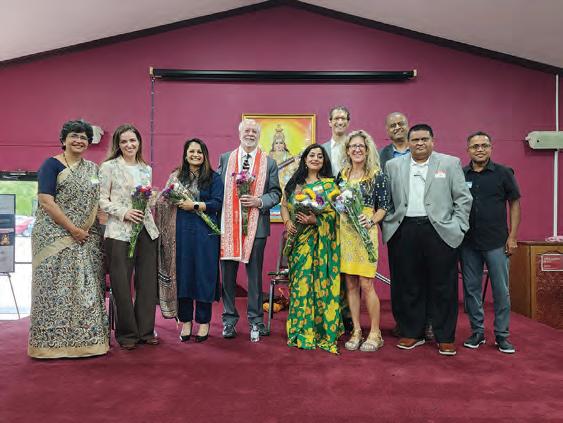
After arriving at the Monroeville temple around 4 p.m., participants sipped tea and shared histories.
Tree of Life’s Rabbi Jeffrey Myers donned a prayer shawl he received as a gift during a 2023 visit to the temple.
“It’s like a talit,” Myers said.
Nearly an hour later, Myers joined Congregation Beth Shalom’s Rabbi Seth Adelson on stage to sing “Hatikvah” and “Shalom Aleichem.”
Adelson, who like Myers is a trained cantor, explained the cultural significance behind each piece.
Whereas “Hatikvah” is Israel’s national




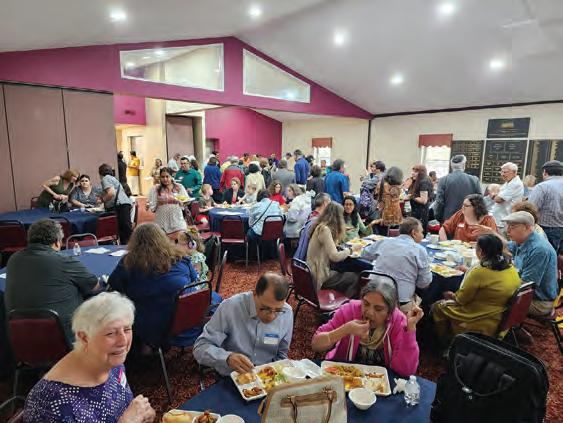
anthem, and references biblical tropes regarding a return to Zion, “Shalom Aleichem” is traditionally sung by Jewish people on Friday nights as Shabbat begins, Adelson said. “Jewish poetry and music as it has come down to us through the ages always builds on what we had in the past.”
Sheela Rajau, who led attendees in “Jana Gana Mana,” India’s national anthem, said the song encourages an abandonment of conflict and serves as a “timeless call for peace and unity across cultures.”
Laura Cherner, director of Jewish Federation of Greater Pittsburgh’s Community Relations Council, moderated a



conversation between communal leaders and noted the significance of such gatherings.
“It’s so important for our communities to come together and celebrate tradition or commonalities, and to learn from one another,” she said. To have both communities “come together for the specific purpose of building relationships, and bridges, and learn from one another is really such a special thing.”
For more than 3,000 years, “both traditions have gone through a glorious history,” Sai Patil said.




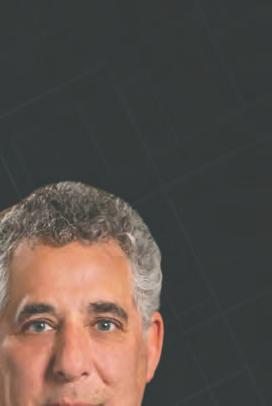































































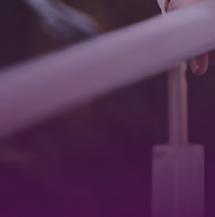

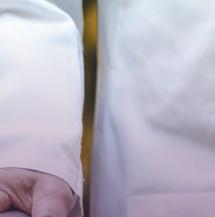







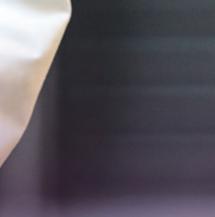







As the region’s only National Cancer Institute-designated Comprehensive Cancer Center, UPMC Hillman Cancer Center provides innovative clinical trials and groundbreaking medical procedures. We proudly o er world-renowned cancer specialists and a compassionate support system for patients and their families. Discover more at UPMCHillman.com/LifeChanging.
Submit calendar items on the Chronicle’s website, pittsburghjewishchronicle.org. Submissions also will be included in print. Events will run in the print edition beginning one month prior to the date as space allows. The deadline for submissions is Friday, noon.
SUNDAYS, JUNE 15–DEC. 28
Join Chabad of Squirrel Hill for its Men’s Tefillin Club. Services and tefillin are followed by a delicious breakfast and engaging discussions on current events. 8:30 a.m. 1700 Beechwood Blvd. chabadpgh.com.
MONDAYS, JUNE 16–SEPT. 29
Join the 10.27 Healing Partnership for Roll for Insight: Community-Building Role-Playing Games. Meet every other week to connect and grow with new friends through playing tabletop role-playing games designed to inspire emotional depth. They will use RPGs to explore the intersection of identity, emotional resiliency and games to fight isolation and disconnection, and to meet new people and form friendships. Free. No experience required. 16 and up. 5:30 p.m. Jewish Community Center, 5738 Forbes Ave. 1027healingpartnership.org/rpg-club.
MONDAYS, JUNE 16–DEC. 29
Join Congregation Beth Shalom for a weekly Talmudstudy. 9:15 a.m. For more information, visit bethshalompgh.org.
Join Temple Sinai for an evening of mahjong every Monday (except holidays). Whether you are just starting out or have years of experience, you are sure to enjoy the camaraderie and good times as you make new friends or cherish moments with long-term pals. All are welcome. Winners will be awarded Giant Eagle gift cards. All players should have their own mahjong cards. Contact Susan Cohen at susan_k_cohen@yahoo. com if you have questions. $5. templesinaipgh.org.
TUESDAY, JUNE 17
Join Chabad of the South Hills for a sourdough break workshop. Learn the step-by-step tips to make your own sourdough. Tools and ingredients included. Prepaid reservations required. $50. 7 p.m. 1700 Bower Hill Road. chabadsh.com/ladies.
WEDNESDAY, JUNE 18
JFCS Pittsburgh presents From Stigma to Strength: Understanding Mental Health History and Managing Anxiety, exploring the evolution of mental health understanding and providing practical tools for today’s challenges and evidence-based strategies for maintaining well-being. Virtual lecture and participation is free. 6 p.m. jfcspgh.org/CounselingRegistration.
WEDNESDAYS, JUNE 18–JULY 29
Temple Sinai’s Rabbi Daniel Fellman presents a weekly Parshat/Torahportionclass on site and online. Call 412-421-9715 for more information and the Zoom link.

Bring the parashah alive and make it personally relevant and meaningful with Rabbi Mark Goodman in this weekly ParashahDiscussion: Life & Text 12:15 p.m. For more information, visit bethshalompgh. org/life-text.
Join the Holocaust Center of Pittsburgh for a screening of “Perseverance: One Holocaust Survivor’s Story,” the newest edition in PA Cyber’s Emmy-nominated Moments in History series, that tells the story of local Holocaust survivor Melvin Goldman. The screening will be followed by a conversation between Goldman’s daughter and filmmaker Scot Rutledge. 6:30 p.m. Chatham University’s Eddy Theatre, 1157 Murray Hill Ave. eventbrite.com/e/perseverancescreening-registration-1325346610389?u.
FRIDAY, JUNE 20
Gather in Rodef Shalom’s Biblical Garden for a 20s and 30s Kabbalat Shabbat. Get to know other young Jewish professionals and close out the week with apps, wine and great company. Registration required. 7 p.m. 4905 Fifth Ave. rodefshalom.org/lateshabbat.
Do you have a tried-and-true dish that comes with an interesting origin story? If so, we want to hear from you!
Submit recipes along with their backstories to newsdesk@pittsburghjewishchronicle. org, and write “Recipe” in the subject line. Please include a photo of the dish. You may see your submission as part of our column “Savoring Stories”! PJC
Join Chabad of the South Hills for Baby Loves Shabbat, music and movement for ages 0 to 3. Challah making and Shabbat songs. 3:45 p.m. 1701 Bower Hill Road. chabadsh.com.
Zionist Shabbat is a pre-Shabbat soiree with the goal of bringing together Pittsburgh’s young adult (aged 22-44) community to celebrate our shared love and support for Israel. Israeli hors d’oeuvres and wine will be served. Joined by Amy Albertson, a social media star and Israel and Jewish advocate who excels in speaking about Israel, Jewish pride and combatting antisemitism. $18. 6 p.m. Jewish Community Center of Greater Pittsburgh, 5738 Forbes Ave. jewishpgh.org/event/ zionist-shabbat.
SUNDAY, JUNE 22
Join Chabad of the South Hills for the South Hills Jewish Festival. Enjoy cultural crafts, kosher wine tasting, a kosher BBQ and fun zone. 1 p.m. 1700 Bower Hill Road. Free tickets available at chabadsh.com/festival. PJC

The Pittsburgh Jewish Chronicle invites you to join the Chronicle Book Club for its June 29 discussion of “My Father’s Paradise: A Son’s Search for His Family’s Past,” by Ariel Sabar. e author will join us for part of the meeting. is 2008 National Book Critics Circle Award Winner was described by the Los Angeles Times as “a biography, a memoir, a meticulously reconstructed history of a largely vanished people and place. ... Transcending mere reportage, it acquires a novel-like warp and we .” A compelling read, this book chronicles the author’s journey to understand his father’s KurdishJewish heritage in Iraq, where an ancient Aramaic-speaking community once thrived.
Your hosts
Toby Tabachnick, Chronicle editor
David Rullo, Chronicle senior staff writer
How it works
We will meet on Zoom on Sunday, June 29, at 1 p.m.
What to do
Buy: “My Father’s Paradise.” It is available from online retailers, including Amazon and Barnes & Noble. It is also available through the Carnegie Library system.
Email: Contact us at drullo@pittsburgh jewishchronicle.org, and write “Chronicle Book Club” in the subject line. We will send you a Zoom link for the discussion meeting.
Happy reading! PJC
— Toby Tabachnick


By Deborah Weisberg | Special to the Chronicle
Steve Harr and Tom Stutz met as third graders at the former Wightman School in Squirrel Hill 76 years ago and have been close friends ever since.
They are part of a group of 11 midoctogenarians — all Jewish — who graduated from Taylor Allderdice High School in 1958 and recently reunited in Pittsburgh for a celebration of connectedness that has spanned marriages, divorces, births, deaths and other major milestones.
It was the latest in a series of gatherings that began in 1985 when Harr and Henry Slesinger arranged the first get-together in Pittsburgh. They call themselves The Dragons after Allderdice’s mythical mascot.
“We had stayed in constant contact with one another over the years but wanted to do more than touch base by phone,” said Harr, 84, a retired pharmaceutical company executive who has lived in Boston for the past 55 years. “Our second event was in Martha’s Vineyard, where I have a house, the year we all turned 60.”
Other reunions have been held in West Virginia, Los Angeles, Napa and Sante Fe,
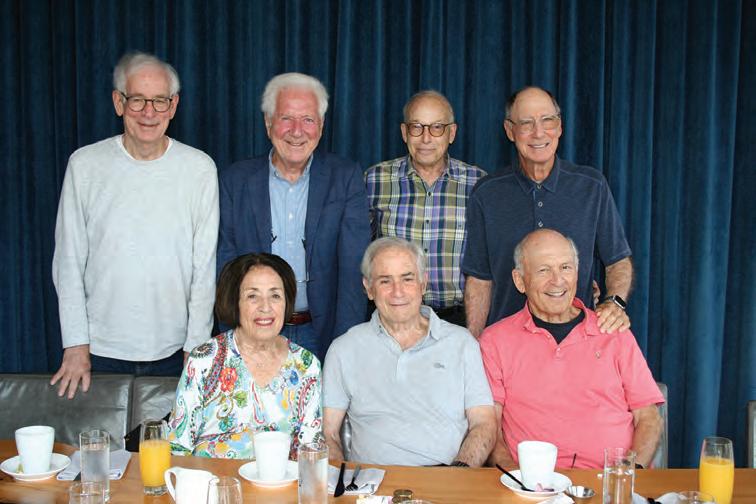
and include wives and girlfriends.
“A lot of us have known each other since kindergarten, and Wightman, Colfax or Linden (elementary schools),” said Slesinger, 84, who lives in Manhattan and is the retired owner of a marketing and advertising agency in Phoenix.
The group began to form at Allderdice through various fraternities and sororities, said Carol Steinbach, 84, of Oakland, a retired bank manager. “Squirrel Hill was such
June 16, 1947 — Violinist Bronislaw Huberman dies
a close-knit community back then we would walk to each other’s houses for parties.”
Most of the members scattered for college and careers that have taken them all over the world, which makes reconvening in their hometown even more special.
The week’s itinerary included guided tours of Phipps Conservatory and Botanical Gardens, the University of Pittsburgh Nationality Rooms and the Carnegie Museums. At LeMont restaurant on Mt.
Washington, the group was reminded of the city’s iconic view while dining on specially prepared vintage treats including toasted pecan balls with hot fudge sauce.
A tour of Allderdice was especially nostalgic.
“It smelled the same — of musty books — and I remembered the names of all my teachers,” remarked Bill Reinfeld, a university economist who divides his time among Boston, Martha’s Vineyard and Taiwan.
“I didn’t remember the hallways being as long as they were,” quipped Slesinger, who found that the visit evoked warm memories, plus an opportunity that had eluded him as a student.
“I was finally able to get up on stage, something I’d always wanted to do, although I think I once played a tree.”
When the group learned about the school librarian wanting comfy chairs for a reading nook and more science books they decided to crowd-fund among themselves to help make that happen, Slesinger said, “as a donation from the class of ’58.”
In their free time, some members visited the graves of loved ones, and went to see their childhood homes, including Stutz, who grew up on Malvern Street and found the same sycamore trees shading the front


June 13, 1947 — Diplomat, Judge
Elyakim Rubinstein is born
Elyakim Rubinstein is born in Tel Aviv. He participates in Egyptian peace talks in the 1970s, chairs the delegations to the Madrid peace conference and Jordanian peace talks, and serves on the Supreme Court from 2004 to 2017.
June 14, 1985 — TWA Flight 847 is hijacked
Two Lebanese men hijack TWA Flight 847 between Athens and Rome and force the 727 to fly to Beirut. The terrorists kill a U.S. Navy diver and separate out suspected Jewish hostages.

p The U.S. Navy in 1994 named an Arleigh Burke-class destroyer after Robert Dean Stethem, the sailor killed by the terrorists who hijacked TWA Flight 847 in 1985. U.S. Navy
June 15, 1970 — Refuseniks are arrested before stealing plane
A plot to steal a 12-seat commercial aircraft to escape the Soviet Union is foiled when 12 dissidents are arrested at a Leningrad airport. The case draws attention to refuseniks, who are Jews blocked from emigrating.
Violinist Bronislaw Huberman dies in Switzerland at 64. A native of Poland, he founded the Palestine Symphony Orchestra in the 1930s and saved 90 Jewish musicians from Europe by giving them places in the orchestra.
June 17, 1939 — St. Louis returns to Europe
The MS St. Louis completes its recrossing of the Atlantic to Europe after all but 28 of the 938 Jewish refugees on board are denied admission to Cuba or the United States.
June 18, 1890 — JNF land buyer
Avraham Granovsky is born Avraham Granovsky (Granot after making aliyah in 1922) is born in Moldova. For the Jewish National Fund, he leads the purchase of thousands of dunams (quarter-acres) of land, helping define Israel’s borders.
June 19, 1967 — LBJ outlines 5 principles for peace
President Lyndon B. Johnson lays out five principles for Middle E ast peace in a speech at the State Department. He does not demand Israel’s surrender of land captured in the SixDay War. PJC
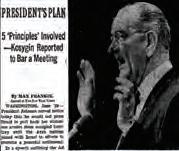
p A New York Times report in the June 20, 1967, issue covers President Lyndon B. Johnson’s speech the previous day on peace in the Middle East.

























By Family Features
Gardening can be a simple way to beautify your yard, relieve stress and save money on your grocery bill, but like any hobby, you can get carried away buying necessary equipment.
Fun, frugal and environmentally friendly, these tricks can help you create a cost-effective garden:
Use a yardstick and permanent marker to mark inches and feet on the handle of your rake, shovel or hoe. The next time you plant, simply lay the marked handle along the row to create perfectly spaced holes for seeds.
Line the bottom of a clay pot with a coffee filter to keep soil from leaking out the bottom.
Use empty plastic water bottles or clear milk jugs to fill the bottom of large pots.
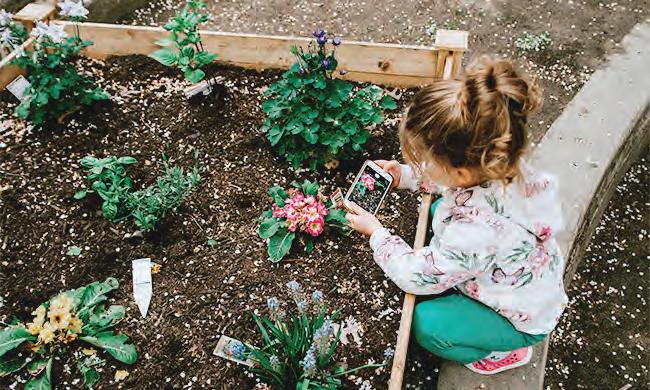
They reduce the weight of the pot and require less soil to fill.
To test your seeds to see if they’re still viable for this planting season, place a wet paper

Our experience with Josh and Julianna was wonderful from our initial consultation to installation. They were very helpful to us in our decisions regarding the type of window treatment, fabric, and color. Josh and Julianna make a great team for installation, design, and customer service.
- Jody M, Wexford PA


towel inside a zip-top bag, drop in 3-4 seeds and wait a week to see if anything grows.
One way to help prevent weeds is lining your garden with a layer of newspaper.
Just top two or three sheets of newsprint with a layer of pine needles, grass clippings or dried leaves for an eco-friendly and inexpensive weed barrier.
Keep gardening twine handy. Nail a funnel to your potting bench with the spout pointing downward, feed the twine through and your string will never go missing. For a more portable solution, place a ball of twine inside a canning jar, make a hole in the lid and feed the end of the twine through the hole. Now, you can take twine anywhere, tangle-free.
There is no need to buy expensive potting systems for starting seedlings. Place several cardboard toilet paper rolls inside a clean plastic clamshell, like those used for premade salads. Fill each cardboard tube with potting soil and plant. Once your seedlings grow too tall for the clamshell, simply tear off the top lid.
Find more ideas for creating a garden without spending a bundle at eLiving today.com. PJC



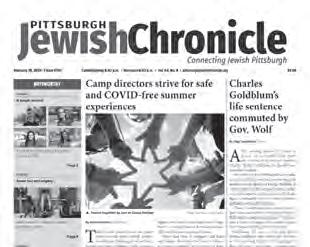














By Family Features
Your home’s first big impression is its curb appeal, so if your place is in need of some sprucing up, you may wonder how you can make some updates without breaking the bank.
These 10 ideas are easy on budgets, but they can also make a big impact on your home’s exterior image.
Paint your front door.
As long as your front door is in good condition, there’s no need to replace it completely. A fresh coat of paint can instantly update your home’s facade. Go bold or stick with a classic hue – it’s all up to you.
Dress up the windows.
Add character and charm by enhancing your front windows. You might add wooden shutters, window box planters or both. Also look at the trim around the windows. If it’s chipped and peeling, adding a fresh coat of paint doesn’t just look nice, it can protect your windows from damage, too.
Clean up flower beds.
An unkempt flower bed can drag down an otherwise stunning home. Keep beds tidy and vegetation trimmed, even during the offseason. Watch for weeds and replenish mulch or rock ground cover as needed to keep the beds looking healthy and inviting.
Install new lighting.
Replacing outdated light fixtures can give your exterior an instant upgrade. There’s no right or wrong style; just choose a color and look that matches the rest of your design.
Replace worn welcome mats.
A cheerful mat at your front door can be an inviting sight for visitors, but those mats
inevitably wear with time, and what was once bright and charming becomes dingy and dull. A new mat can help bring back that cheery entry you once cherished.
Pressure wash the drive and walk.
Over time, driveways and sidewalks collect an incredible amount of grime. Pressure washing not only eliminates the filth, but the clean surfaces also add to your home’s visual appeal.
Add new vegetation.
Landscaping is a relatively inexpensive way to introduce more personality to a yard. Aim for a mix of pretty and practical, such as some low flowering bushes and some trees or bushes that offer privacy and shade.
Keep up with basic maintenance.
When your home is in poor repair, it shows. Pay attention to bent or rusting gutters, imperfections in the roof and other maintenance matters that aren’t just aesthetic; left unrepaired, they can also result in major damage.
Pay attention to details.
Functional items like the mailbox might not seem like much of a design element, but these small details can be a big distraction if they’re not in good condition. Update or replace as needed to keep your aesthetic in sync.
Add seasonal decor.
There’s no need to go all out for every occasion, but some timely decorations that celebrate the holiday or season can make your entry fun and festive. Coordinate wreaths, planters, signs and other accent pieces for a cohesive look that says, “come on in.”
Find more affordable ideas for upgrading your home and garden at eLivingtoday.com. PJC
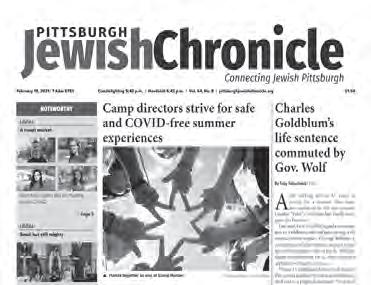





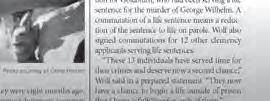

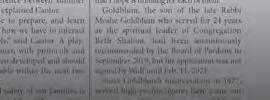











• Interior Painting & Exterior Painting
• Repaints & New Construction
• Wallpaper Removal
• Deck & Fence Staining/Refinishing
• Faux & Decorative Finishing
• Interior & Exterior Trim Packages

• Drywall & Wood Repair
• Holiday Light Installation
• Cedar Siding Staining
• Brick and masonry painting
• Stucco and EIFS painting & repairs
• Log Home Staining



• Aluminum and Vinyl Siding Painting
• Roof Coatings
• Pre-Paint carpentry and repair options
• Cabinet Refinishing
• Multi Family Property Painting ... and more!
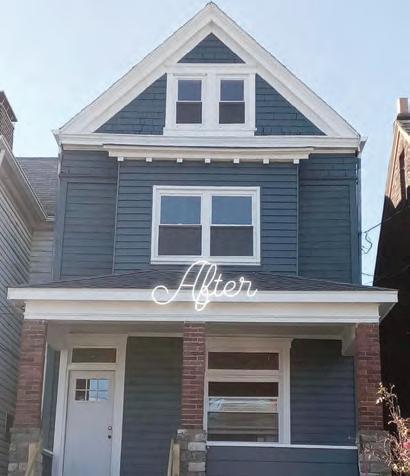



Antisemitism:
Continued from page 1
Tree of Life building on Oct. 27, 2018, as well as a text message the defendant sent to a friend asking if they were ready to “hunt down Jews for extermination.”
Outlining her investigation into the threats, Patcher recounted a series of lies Owens allegedly told the FBI.
After obtaining a search warrant for his phone, Patcher and another agent questioned Owens at a Squirrel Hill restaurant where he was eating with his girlfriend. Owens, the agent said, told several falsehoods during the voluntary interview, including that he hadn’t sent the threatening messages, that he didn’t know who Casey Jones was, that his phone must have been hacked and that he had no biases toward any groups or people. He also lied about the number of guns he possessed and where the guns were, initially telling Patcher that his grandmother in Butler County had possession of two rifles he owned for hunting, and saying they were the only firearms he owned, according to the FBI. He eventually admitted that the Casey Jones alias was his, saying he used that name when selling items on Facebook Marketplace.
When confronted with the information that Patcher traced the threat to an IP address at Owens’ home, he said he may have sent the message but was most likely “blacked out”
Henry:
Continued from page 1
Ohio, she casually asked her best friend if she thought Henry would make a good rabbi. Her friend said yes. If Henry had asked someone else, or if her friend had said no, Henry might have chosen a different path.
But maybe not.
She has always had a love for Judaism, she said, as well as synagogue services. Growing up, her family was affiliated with a Reform congregation in Cleveland, but at one point, she said, she “influenced my parents to join the Conservative synagogue around the corner from our house.”
She became a regular attendee there, and part of “the little youth corral” along with several friends.
Her parents, though, were less enthused about the Conservative congregation and soon returned to their Reform synagogue. There, Henry remained active, as she was “always interested in Jewish learning” throughout her high school years, she said.
While she was “disconnected” from Judaism during her time at the University of Wisconsin-Madison, after graduation, she took a six-month trip to Israel where she was inspired by the learning and commitment of some of the religiously observant people she met there.
“And then six months later, I just asked my friend, ‘Do you think I’d be a good rabbi?’”
“I never looked back,” Henry said. During her time as rabbi at Rodef Shalom, Henry has worked to make congregational life “more intimate, definitely less formal,” Henry said. “Those are the things I’m proud of.”
Services at Rodef Shalom used to be 35 minutes long, with a lot of English and not much participation from the congregation, Henry said. There was a four-person quartet, which Henry praised, but she envisioned something more.
Henry collaborated with Don Megahan, the congregation’s music director, to introduce various styles of music, she said, and now “people participate.” Over the years services have “evolved to the place where, for the last two years, we’ve had a cantor.”
Another change that occurred on Henry’s
drunk. Owens’ girlfriend, who was interviewed separately at the restaurant, said that he was not drunk the night the threatening message was sent.
Both Owens’ mental health and his abuse of alcohol and cannabis were frequently referenced by both the government and defense attorneys.
After Patcher’s initial conversation with Owens, he left the agent a voicemail saying that he had a new cell phone and that he needed “to own up to what I did,” saying that he “was just a keyboard warrior” who “sometimes lashes out.”
Owens was arrested on May 30 after appearing at the FBI’s South Side office to, he believed, pick up his phone.
During an interview with Patcher and another agent at the FBI, Owens admitted to sending the threatening message but blamed it on issues with alcohol, something he said has been a problem since he was 21, and his frustration with Israel and “what’s going on in Gaza right now.”
He said he understood that the threats had frightened the public official who, Patcher said, was now terrified of doing their job or appearing in public, fearing for their safety and that of their family.
Owens denied having any connection to extremist groups during his interview with the FBI and said he “had no plans to do anything crazy,” noting that he has no history of violence.
watch, she said, was the renovation of the sanctuary “to make it more inclusive, more accommodating for people with disabilities.”
While “it’s not perfect,” she said, because the ark isn’t accessible to everybody, congregants can access the reading table more easily. Ramps on either side were installed, and “we lowered
Asked again about his guns, he told the agents that he owned two rifles, which he turned over to his mother “a while ago” and that he had a Smith and Wesson handgun, also at his mother’s home.
When the FBI searched Owens’ truck, they found the handgun along with hundreds of rounds of ammunition and an AR-15 rifle, which he owns.
Owens told the agents he assumed the person he threatened was Jewish but wasn’t sure, but he knew they supported Israel.
The only other witness to testify was Owens’ mother, who said he could live with her if he were released pending trial, as long as he received mental health and substance abuse treatment.
Burtner-Owens, who broke down in tears during her testimony, said she owns her own business as a nonprofit consultant and that she works out of her home two or three days a week.
Owens’ mother also testified that she asked him for his weapons after she picked him up from the Squirrel Hill restaurant following his questioning by the FBI, because she feared he would hurt himself. That point contradicted the timeline Owens presented to the FBI about when he gave his mother his guns.
Following the conclusion of witness testimony and closing arguments by the government and defense attorneys, Kelly said there were several factors to consider
the Chronicle was yet another example.
“ This room has historically been occupied by the senior rabbi, and now it’s a communal room where people could have meetings, where there’s always food, where the library is free.
“And they’re naming this room after me,” she said.
“What I’ve really learned over my years in the rabbinate is that it’s not about me. It’s about how I make other people feel, what I can help other people learn, how they should be walking out of something I do, talking about an idea or something that affected them.”
–RABBI SHARYN HENRY
the bimah down so it’s more accessible — but it also brought the rabbis closer to the congregation, which is something that I wanted.”
Another project Henry shepherded was renovation of the chapel.
“It used to be everybody’s favorite room that they never used,” she said. People might remark they were married there, but hadn’t used the space since because “it was a very uncomfortable room. It had hard benches. It was very dark. So I thought, well, let’s make it a room that everybody loves, that we can actually use.”
The room is brighter now. The benches were removed and replaced with movable furniture, allowing for flexibility. The room can be totally empty, or chairs can be arranged in rows, or the seats can be placed in a circle “so the clergy is right there,” Henry said.
Those improvements “are more than just architectural. They really speak to a different kind of service, where people are closer together. You can hear each other when you’re in the chapel — you can actually hear other people’s voices — and it sounds wonderful, even if there are only 15 people.”
The room in which she was speaking with
when deciding if Owens should be released pending trial.
She cited a pretrial report that said there were no conditions that could reasonably assure the safety of the community if Owens were granted monitored release, and that the nature of the threat was “real,” “significant” and “inflicted terror.” Those, and the weight of the evidence presented at the hearing leaned toward not granting Owens release, Kelly said.
The judge cited Owens’ lack of a criminal record and strong family ties as factors in favor of release.
Owens’ mental health and substance abuse were issues, Kelly noted, before saying that in the end, the defendant’s lies to law enforcement and the guns and ammunition found in his truck were the deciding factors in determining that he should remain in custody pending trial.
Kelly noted she was concerned about Owens’ well-being and would talk with U.S. marshals to ensure he was observed in prison and received mental health and substance abuse treatment.
Throughout the hearing, Owens, dressed in orange prison garb, sat with his head down, only occasionally talking with his attorney. If convicted, Owens faces a fine, up to five years in prison, or both. A date has not yet been set for his trial. PJC
David Rullo can be reached at drullo@ pittsburghjewishchronicle.org.
people’s lives.’”
Her career has taught her that the rabbinate is not about the rabbi, but about how the rabbi impacts others.
“What I’ve really learned over my years in the rabbinate is that it’s not about me,” she said. “It’s about how I make other people feel, what I can help other people learn, how they should be walking out of something I do, talking about an idea or something that affected them.”
It wasn’t an easy lesson to learn. Early in her career, she observed senior rabbis who were the center of attention, who would be the topic of congregants’ conversations. When she came to Pittsburgh, though, she found that people were not talking about her — because if you do it right, it’s not about you.
“And so now, for example, if I do a funeral and people feel comforted, or feel like we honored their loved one, that’s the important part,” Henry said. “Or if they come to a sermon and they have a new idea or a new way of either thinking about something in a different way, that’s what I would consider to be a success.”
Henry is leaving Rodef Shalom as the congregation is preparing to unify with Temple Sinai.
Henry acknowledged that she is “just a different kind of rabbi than has ever been here before.” She recalled Eric Lidji, director of the Rauh Jewish History Program & Archives, asking to archive her papers.
“First of all, it makes me laugh that my papers would be in any kind of archives,” Henry said, “but secondly, what he wanted was interesting to me. He wants my correspondence — in other words, letters that people have written to me.
“When I talked to him about it, I said, ‘You know, other rabbis have their books, their scholarly articles, and I have letters from people telling me very personal things about how they felt, about how I did their parent’s funeral or their weddings. And I said to him, ‘It makes me feel a little awkward.’ And he said, ‘No, no, really, it speaks to the kind of rabbi you are, and I think it’s really important to have that in the archives.’”
When she joked with Lidji, saying that she had letters rather than scholarly articles or books of sermons because “I’m the girl rabbi,” he responded, “No, it’s because you’re approachable and make a difference in
That’s by design.
“I actually planned my retirement to make it easier for the transition,” she said. “And as much as it’s an exciting opportunity, and as much as I’m a flexible thinker, I think it’s time for the next generation or iteration of leadership to take over.
“So now I think it’s a good time for me to figure out what the next part of my life will look like, and let a different generation lead this new charge.”
As for the next chapter of her life, Henry plans to give herself six months to figure that out, but suspects it will a part-time position connected to Judaism or a nonprofit.
Henry will be honored by Rodef Shalom on Shabbat, June 13-14, during a series of events, featuring artist-in-residence Dan Nichols. The weekend will include services, music, Torah study and a special Havdalah service at Frick Park.
The first winner of the Rabbi Sharyn H. Henry Social Justice Award also will be announced. PJC
Toby Tabachnick can be reached at ttabachnick@pittsburghjewishchronicle.org.
Continued from page 2
“In this respect, the main mission of the Jewish Agency is to unify the Jewish people all over the world,” he said.
Israel, Almog said, is a miracle, especially in what he calls “this time of polarization.” Its existence, he said, should show Jews that they have a duty to be proud.
“It doesn’t matter how much antisemitism is in the world. Human rights are Jewish rights. Continue walking tall and continue building the Jewish nation. Continue healing society,” he said.
A perfect example of that nachas, he said, are the ShinShinim (young Israeli emissaries) here in Pittsburgh. He said they bring Israel with them when they travel and are doing important things, like helping plan the Maccabi Games that will be held in Pittsburgh Aug. 3-9 and will include more than 2,000 Jewish teens.
Hindu:
Continued from page 4
The active temple member, who serves as director of project management at Viatris, said Hindus and Jews can learn from each other’s “perseverance.” Despite experiencing various atrocities, both groups “continue to exist, continue to fight and continue to survive.”
This moment calls for greater mutual reliance, Bhavini Patel told attendees.
“At a time when so much of the world can feel divided, uncertain and scary, gatherings like this remind us of something very powerful: We are stronger, wiser and more joyful when we come together,” the former candidate for Pennsylvania’s 12th Congressional District and current executive director at Sustainable Pittsburgh said.
Led by spiritual guides and communal leaders, the nearly 200 attendees closed the formal program by singing “America the
Dragons:
Continued from page 7
yard. He also visited a buckeye tree at the Schenley Park Golf Course where he often went to meditate as a teen.
“It was very nostalgic,” said Stutz, a retired lawyer who lives in Los Angeles. “The whole week has been nostalgic. It’s been beautiful.”
It was a touching experience for Robbie Reicher, of Los Gatos, California, a retired chemical engineer who left Pittsburgh in 1962. “The (San Francisco) Bay area is a great place to live,” he said, “but Pittsburgh still feels like home.”
The group reminisced about going to the old Isaly’s at Forbes and Murray to buy Klondikes or a bag of fries, “just before the Sabbath,” Slesinger said.
They recalled walking to school — “for some of us it was a couple of miles,” Steinbach recalled — to convene every morning at
“They live here, and they do a lot to bridge
the world,” Almog noted.
The ShinShinim, he said, are proof of the promise made when Israel was founded, that a Jewish state can live peacefully with its neighbors.
“It’s very important. It’s essential and it’s existential,” Almog said. “We say many times that the state of Israel is a startup nation. It’s a guarantee that Jews from all over the world have a nation,” he said.
Rabbi Danny Schiff, the Federation’s Gefsky community scholar, moderated the discussion with Almog at the Federation event on June 5. Schiff said Pittsburgh’s commitment to the Jewish Agency matters.
“Our support of the Jewish Agency is a powerful demonstration of how serious we are about our commitment to Israel and world Jewry,” Schiff said. “The contributions we provide make a real difference in rebuilding Israel and in helping Jewish communities that are at risk.” PJC
Beautiful.” Afterward, participants moved to another portion of the temple’s community hall to enjoy a catered vegetarian dinner from Udipi Cafe. Kosher meals, under Vaad supervision, were also available.
Pittsburgh’s support of Israel and the
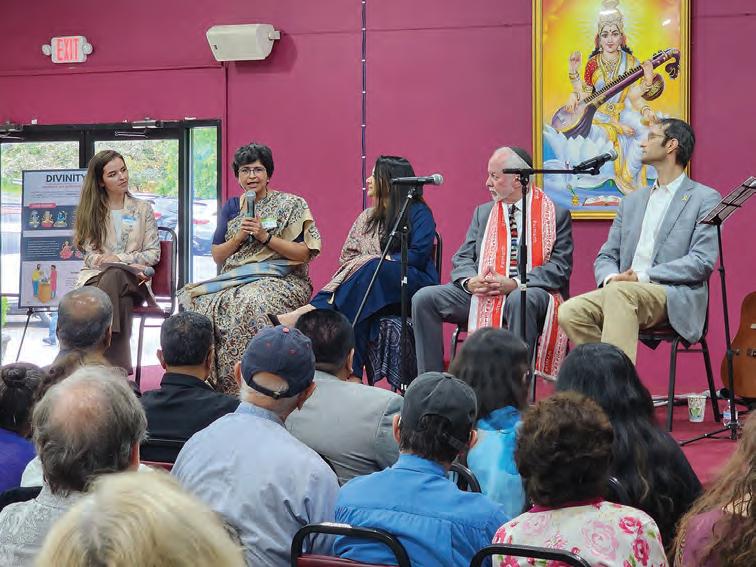
Before the evening’s close, Julie Paris, StandWithUs Mid-Atlantic regional director, told the Chronicle Sunday’s program resulted from “years of discussions between Hindu leaders in the Pittsburgh community and
“I cannot tell you how blessed we were. It was a very wholesome time.”
–BILL REINFELD
“the wall,” a student hangout on Allderdice’s Tilbury Avenue side where some kids, but not this group, went to smoke.
“Cliques form in high school and a big part of it is looks and popularity,” Reicher said. “We were a cool group.”
They used fraternity dues and the proceeds from paper routes and other part-time jobs to sponsor dances in the ballrooms of the Webster Hall and William Penn hotels, and made Saturday night forays to the Crawford Grill in the Hill District to hear live music. “We loved jazz,” said Reinfeld. “You had to buy drinks, so we’d order whiskey
Israel, Almog said, is a miracle, especially in what he calls “this time of polarization.” Its existence, he said, should show Jews that they have a duty to be proud. www.pittsburghjewishchronicle.org
sours. We were just 16 but we never got carded.”
Growing up in the 1950s was idyllic, he said. “There were no global problems, no wars. We were all good students from middle-class families and had no worries. We loved to laugh and tell stories. We had creative parties where we made up skits.”
“I cannot tell you how blessed we were. It was a very wholesome time.”
Reunions help members feel connected not just to each other but to that magical era, Reinfeld said. “We still see each other
David Rullo can be reached at drullo@ pittsburghjewishchronicle.org.
Jewish leaders looking for ways to connect, realizing that the rise in hate targeting both the Jewish community and the Hindu community is dangerous, and that together we can be stronger.”
Shared communal values, she continued, is a reminder that although “both of our communities are under attack, we are committing to digging deeper into who we are, to learning about one another and to investing time in our community for the greater good.”
David Knoll, chair of Federation’s Community Relations Council, praised the event and said he hopes to see new relationships bloom.
“I think any chance for faith-based communities to get together in friendship and support is desperately needed, not just in times like this but at all times,” he said. “We need to come together and learn from each other.” PJC
Adam Reinherz can be reached at areinherz@pittsburghjewishchronicle.org.
the way we were in high school.”
For Neal Wein, of Los Angeles, and retired from work in media sales, “It was great to see old — and I do mean old — friends again.”
That some of the Dragons have died has brought the group even closer, Reinfeld said. “We have known each other longer than we have known our spouses. We are as close as brothers and sisters.”
And while they are bonded through the past, the group also looks to the future, with talk that the next reunion is likely to be a cruise in two years, Harr said, noting how precious the gatherings are.
“You can make close friends over the course of time, but they’re not quite like the friends you first made 70 years ago and have a shared history with. It’s just something you can’t duplicate.”
“We don’t have to say how much we like each other. It’s understood.” PJC
Deborah Weisberg is a freelance writer living in Pittsburgh.
Many awoke on June 1 to read head lines on fire from all the usual mainstream suspects claiming that yet another massacre occurred at the hands of their favorite hated Zionist entity, this time in one of the Gaza Humanitarian Foundation centers, and worse, during aid distribution.
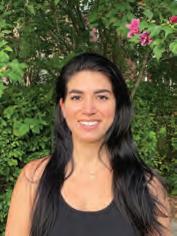
Obviously, it is harmful enough when such crazed rhetoric is believed in ignorance, but it is a different degree of sinister malice to knowingly spread life-threatening libel … and these organizations knew exactly what they were doing.
As is the case by now, the natural reaction was to roll my eyes and wonder what the actual number of eliminated terrorists was. Without much searching, it turned out the number was a grand total of zero … because the event never happened.
It was again just another blatant lie casually thrown out by Hamas and their callous c ohorts. Just like the great parking lot massacre at Al-Ahli Hospital. Just like IDF executing Gazan children by shooting them in the head. Just like the 14,000 dead kids in 48 hours who weren’t actually going to die. Just like every bit of manufactured news that comes out of that terror-infested strip.
We’re used to this. The only difference is that this time it was not just on-brand exaggeration but complete fabrication. While this isn’t unexpected behavior for a Machiavellian death cult in an increasing pressure cooker, it takes two to tango with spreading terrorism to Western minds, and so the true problem is the always-waiting vampiric media, ever thirsty for their next dose of blood libel … the same media that willingly and eagerly reported this phantom episode as if it were truly made of flesh and blood.
Never mind that they later admitted in print that they have no way of verifying the “tip” they received. No video footage or neutral witnesses whatsoever.
Never mind that after 20 months, they are still taking the word of literal terrorists who have a penchant for deception. No conflict of ethics there.
Never mind that this is truly something that could be (and was) easily refuted with just an ounce of time and evidence. No need to wait for those nuisances.
Here we have the true insidious objective of such a deliberate decision: intentionally spreading grotesque yet identifiable lies, not simply because truth is not valued, but because the propagandistic damage that it will inflict on the average reader cannot be undone. The reality is that the vast majority of the audience who readily chooses to consume such “news” is either dangerously
need to be inspired by some fiery headline. These fanatics are already psychopathically ready to go.
Instead, the media’s cocktails of lies serve to desensitize the rest of the population who won’t necessarily go to the same violent lengths. In this purpose, these repeated alternate realities not only become so typical that they are accepted as reality, but are readily accepted as reason for such crimes when they eventually occur. Therefore, these bombs don’t just seek a reaction from the most combustible of society. They genuinely seek to normalize and ingrain such reactions as legitimate, unavoidable and necessary.
Each instance is a true Molotov cocktail, a piece of incendiary propaganda deliberately tossed to set reality aflame and watch it burn.
ignorant to the truth of the situation in Gaza or already has an unshakeable predisposition against Israel. Clearly those still choosing ignorance by this point have no inclination to look up the truth, and those choosing bigotry have no interest in truth whatsoever. So when a retraction or correction is published, assuming it is even noticed while buried far down the page, the weight of the original lie will continue to remain, anyone calling out inaccuracies will be written off as a lying Zionist, and therefore the ultimate goal of inflicting deeply antisemitic harm stays intact. Each instance is a true Molotov cocktail, a piece of incendiary propaganda deliberately tossed to set reality aflame and watch it burn.
So it’s no surprise when Molotov cocktails start getting thrown around in real life as well.
Many have said that the recent antisemitic crimes of murder and arson were directly caused by the explosive media hit pieces that aired hours to days beforehand, but I disagree. Anyone who is so fully entrenched in the ideology of jihad that he is willing to give it all up to take out some Jews doesn’t
This literary arson is just the latest in a long line of timeless attempts to paint Jews as cold-blooded, blood-lusting, murderous beings lacking any humanity. It is the single most important linchpin of the antisemitic playbook, because if one can prove that Jews are void of humanity, it is then more than reasonable to treat them as subhumans, and therefore rational to lay a pathway for the destruction they deserve. The flambéed cherry on top is that this programming inevitably and intentionally aids in discrediting and disparaging subsequent Jewish alarm and outcry over a world burning around them. Nothing more appropriate than adding a little gaslighting onto the bigoted bonfire, I suppose.
It has been nothing short of, well, utterly inflaming to watch this cycle of lie, “apologize,” and lie again, play out in various ways, on various topics, and in various “reputable” publications for years.
Our world has boards and organizations for policing malpractice among medical and legal fields in order to deter harm through unethical behavior and punish those who
still cause it. Why is there nothing of the kind in place for journalism?
An unethical physician or attorney can cause harm to dozens of individuals during their time of practice, but the damage is typically localized. Conversely, an unethical journalist at a major news outlet can spread harm to millions of readers, locally to internationally, with a single publication. Given that such harm can carry across the world and through later generations, how is this danger not taken as seriously?
At least in the case of the Jewish state and community, the depressing reality is that because libel against Jews and the desire to cause harm is so ancient across time, and so ingrained in society, it is not assumed to be something worth taking seriously at all.
It is shameful that at the same time Israel is forced to fight a physical war among multiple neighboring enemies, it is also subject to a written war across the globe … and with supposed allies.
It is shameful that we live in a world where the Jewish state is so dehumanized that, as the saying goes, it is forced to continually turn out its pockets to prove its innocence — while its antagonists, military or literary, never have to prove their wild accusations in the same way.
And it is despicable that when the loaded antipathy makes the short leap from page to pavement, it is seen as not only understandable, but worse, considered defensible. It is nearly impossible to think of another industry that has performed its job so badly in public for all to see. Though it shouldn’t be on us, it does start with all of us calling out every piece of vile libel thrown out to the public, and never tolerating timeless as acceptable. Jews in the legal field must brainstorm ways to take tangible action against these brazen perversions of reporting, and it is essential that we all stop indulging the offending outlets through consumption of any of their other incompetent journalism.
As the saying goes, you truly do not hate the mainstream media today enough. It’s time to do so like your life depends on it, because as we’re starting to see, it just might. PJC
Sarah Kendis is a musician living in Pittsburgh.
Judaism never asked me to choose between identity and belonging
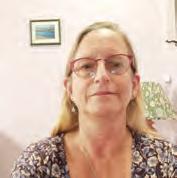
When I came out as a lesbian in 1991, my greatest guilt concerned ending my marriage and hurting my very good husband. I felt none of the guilt and shame that many queer people have about being sick, perverted, rejected by G-d or ostracized from a religious community. Even my family came around quickly. (I later
found out that my grandparents played bridge with a lesbian couple for decades starting in the 1940s.)
Judaism had taught me how to live as a lesbian — and the people around me how to accept that. First, as a Jew, I already knew how to live as a minority. My parents taught through example how to decide whether to be open, quiet, or hidden in a hostile environment. My religion taught me to strive toward holiness with my whole being, and did not consider my body or my sexuality to be profane. My experience as a Jew taught me the erosive impact of the majority community assuming that everyone is just like them, how
to guard my personal identity from it, and how to speak up for others who were marginalized. I learned that I got to define my Jewish identity, not the non-Jews who saw me as “Christian without Jesus,” or called Chanukah “the Jewish Christmas.” So many of my non-Jewish peers needed to choose between their religious affiliation and living authentically with non-straight identities. In the community, a friend told me that she and her female partner were welcomed just like other mothers when they brought their children to religious school in the 1980s. I later found out that another friend had served as an openly gay rabbi in Altoona and Warsaw in the
1990s. I wondered if the acceptance was unique to Reform Judaism. Then another friend told me about coming out to his Orthodox rabbi: The rabbi held both of his hands and said, “I want you to keep coming to shul, and I will head the line of friends welcoming you here.”
As I learned about LGBTQ+ history, I was proud and not too shocked by the outsized contributions of Jews: Alix Dobkin and Maxine Feldman in women’s music, Harvey Milk and Barney Frank in gay rights politics, Andrea Dworkin, Leslie Feinberg and Judith
Last week, the Chronicle asked its readers in an online poll the following question:
“Are you a Zionist?” Of the 290 people who responded, 78% said yes; 14% said no; and 8% said they weren’t sure. Comments were submitted by 81 people. A few follow.
I believe the state of Israel has the right to exist — as acknowledged among the vast majority of the world, including by a U.N. majority. Israel is and ought to be subject to the same rights, privileges and scrutiny as any other sovereign nation. That Israel should come into question regarding whether the state should exist as a self-determinative nation is wrong and, frankly, a cruelty to its citizenry.
I am a reluctant Zionist. I support Israel’s existence as a Jewish homeland while being deeply troubled by the contradictions this creates. I believe Jewish people deserve safety and self-determination after centuries of persecution, yet recognize that ethnostates are fundamentally problematic and incompatible with true democracy. Israel’s security and Jewish identity shouldn’t come at the cost of equal rights for all citizens, so while I am supportive of the concept, I remain critical of the current implementation.
I’m proudly Zionist! What does it mean? Believing that the Jewish people have a
The recent times are perfect examples of why we need a place to feel safe
What is the definition today? The answer I grew up with no longer works for me. The issues are far too complex and I feel lost.
We have been praying facing Jerusalem for 3000 years. One cannot be Jewish and not be a Zionist. Believing anything else is performative nonsense.
Not anymore.
I wasn’t a Zionist until Oct 7. Every incident from that day forward has reinforced the need for Israel as a safe space for Jews.
Zionism is an essential component of contemporary Jewish identity. To deny the right of Jewish self-determination in our historical homeland is to opt out of Jewish peoplehood
Zionism is an integral part of Judaism. Our peoplehood is deeply connected to the land of Israel. More than half the commandments cannot be fulfilled outside of Israel. The longing for Zion can be traced through our liturgy and holidays. Jews who identify as nonZionists are simply Jews disconnected from Judaism. There is no Judaism divorced from Zion.
The term has been used in so many ways that it’s no longer useful
Butler in feminist writing … and of course there were so many more of us contributing to the larger world.
Bet Tikvah, founded in 1988, is Pittsburgh’s LGBTQ+ congregation, a vibrant community in which we are not a minority. It also b ecame a welcoming community for other marginalized Jews in the early days, including interreligious and interracial couples. It was a place where queer Jews could gather and build community. I joined when I m oved back to Pittsburgh in 2003. I also prayed at Rodef Shalom Congregation
legitimate claim to their own homeland; that the Jewish people have a long and storied history that binds us together — miraculously, by the way — over time and space.
I believe Zionism is the idea that Jews need and require their homeland to exist.
without ever hiding, and at a synagogue in Morgantown, West Virginia, with a gay rabbi. But Bet Tikvah became my religious home. As other congregations welcomed us more openly, Bet Tikvah’s membership has shifted toward Jews who are atypical in their gender identification, rather than their sexual orientation — at this moment in history especially, trans and non-binary people of all religions need safe havens.
Being a Jew also helped me to be open to an extremely rewarding relationship with a proudly Jewish transman. We talked about the troublesome passage in Leviticus: “You will not lie with a man as you would a woman.”
This piece of Torah is one that many of us
The next generation of terrorists has already been born
Children learn their beliefs and behaviors from the parents they love, teachers, clergy and others they respect. What is learned when young is likely to become the default behaviors and beliefs that will persist throughout their lives.
Jewish children are taught to love Judaism, its practices, rituals and beliefs — beliefs which promote a quality of life that is associated with kindness, caring and helping those in need. There are other children being taught to hate the Jewish religion, those who are Jewish and Israel. For many of these children, these will be their default behaviors and beliefs.
As children age, default beliefs will be supported by their communities and social relations. Depending on the community, for many this may promote kindness, but for others, it may promote antisemitism. Those children who are learning their default behaviors from those who are terrorists, are likely to become the next generation of terrorists (“‘Crisis fatigue’ and fear grip Jewish community after Washington attack,” May 30).
It is essential to reverse these patterns. It will take time and reaching out with kindness and patience to those we may currently not wish to interact with. Not easy, but we must change the default behaviors that have been implanted in so many.
Unfortunately, too much of the news today characterizes Jews and Judaism in a negative light — as cruel and even violent. We need to make people aware of the positive aspects of Judaism, including the friendship, kindness, support of others, positive thinking and caring relationships. That message will hopefully bring people together as a unified
I am a progressive Zionist, who supports J Street.
I am a Zionist. That means that I support the existence of a Jewish state in our ancestral homeland, i.e., the state of Israel. I also support the creation of a Palestinian state alongside the state of Israel and the rights of Israelis and Palestinians to live in peace and security.
struggle with, of course. But there have been newer interpretations of it which do not condemn us. My partner also informed me that the Talmud includes discussion of how to integrate people with unusual genders into Jewish life — the Talmud!
Knowing so firmly who I was, not defining myself by how others saw me, I could maintain a lesbian sense of self while being with s omeone who no longer identified as a woman. And he, similarly, could be with a lesbian without feeling his masculinity threatened.
When my beloved died last year, two questions arose: First, what would be written on his gravestone — he could not be listed as either
I’m not a Zionist, and also recognize that Israel is a sovereign nation-state. I’m not asking for it to cease to exist. The divisive language this community has used accusing people like me of not being real Jews is beyond the pale. The Jewish people are inextricably bound with geopolitics, but can’t be expected to act as a monolith within them. Don’t throw out nuance to draw a line in the sand between people who identify as Zionists and the rest of us. It’s harmful. PJC
Compiled
by Toby
Tabachnick
Chronicle weekly poll question: Have you blocked someone on social media because you disagree about the Hamas/Israel war? Go to pittsburghjewishchronicle.org to respond. PJC
the son or the daughter of his parents. The Jewish memorial company researched and found an answer. Second, would his body be prepared for burial as the man he identified as? Or as the woman he was born as? How wonderful it was to discover that the New Community Chevra Kadisha had a protocol for washing and caring for the bodies of trans and non-binary Jews. They were already prepared for us. Knowing that he would be respected, with a body that reflected both a masculine identity and a female history, made me prouder than ever to be a Jew. PJC
Beth Wallach is a psychologist living in Washington County.
community, a community where people support each other, regardless of religion, social status, or education,
If the Jewish community doesn’t take steps to promote a positive message about Jews and Judaism, I worry about the environment my grandchildren will be living in.
Bruce S. Rabin, MD, PhD
Pittsburgh
By Jessica Grann | Special to the Chronicle
Ireally enjoy fresh salsa, and I eat it with more than just tortilla chips. It brightens up so many dishes, from breakfast burritos to tacos and beyond.
I went to grab my favorite brand from the store and the price was close to $7, so I put it back. It seems that most processed convenience foods have doubled in cost the past few years. I already knew how to make salsa and it takes very little effort and time. I knew that even if I used organic vegetables, I could prepare twice as much salsa for half the price.
There are countless versions of salsas and my recipe is a great way to start experimenting with them. Broiling the vegetables to blacken the skins is the key to getting a rich and slightly smokey flavor. Outside of the 20 minutes or so that it takes to broil the veggies, this recipe only takes about five minutes of prep work.
This recipe makes about four cups of salsa, which can be kept up to a week in the fridge if stored in a Mason jar with a tight-fitting lid.
You can and should season this to your taste, so if it needs a little extra seasoning or lime juice, add that in until it’s perfect for you.
Ingredients:
2 pounds Roma tomatoes
2 large jalapeno peppers

1 poblano pepper
6 cloves garlic, unpeeled
⅔ cup diced onion
Juice from 2 limes
1 teaspoon sea salt
⅔ cup fresh cilantro
Optional: 1/8 teaspoon cumin
Set the broiler of your oven on high and line a baking sheet with foil.
Place the whole tomatoes, peppers and unpeeled (in their husk) garlic cloves on the tray and broil for 10 minutes.
Pull out the tray, flip everything and broil for




an additional 10 minutes or so. You will smell the roasted garlic, which needs to come out of the oven after 20 minutes to prevent it from burning. If you think the peppers or tomatoes need more time, roast them for an additional 5 minutes. They should be soft to the touch and have some blackened skin.
Pull the tray out of the oven and allow the vegetables to cool for about 10 minutes. They just need to be cool enough to handle before adding them to your blender.
Use a sharp paring knife to cut out the hard stem of the tomatoes, allowing any juices to fall onto the try.
Cut the stems off the peppers, then slice each one down the middle. Discard the seeds from the poblano. You can reserve the seeds from one jalapeno if you’re unsure about the spice level and add them later if you need to. I use two full, stemmed jalapenos and the salsa is typically on the mild side. If you’re sure you want more heat, you can prepare 3 jalapenos. You also can use serrano chiles, or a mix of the two if you’d like to experiment with different flavors.
Peel off the garlic husks entirely.
Put the tomatoes, peppers and garlic into a blender. Pour any juice from the baking tray in as well. You can do this while they’re still warm.
Pulse the mixture a few times before adding in the fresh diced onion, lime juice and cilantro, stems and all. If you’d like to add cumin, do so now.
Pulse 8-10 more times until the mixture is well blended. Don’t over blend.
Pour into a glass container and allow to cool before refrigerating.
I always taste this again before serving because the flavors can mellow a bit after resting. As I mentioned, you can add a bit more of any ingredient that you’d like to taste more of.
This can separate a bit after resting in the fridge so give it a good stir before serving.
Enjoy and bless your hands! PJC
Jessica Grann is a home chef living in Pittsburgh.

Lee Oleinick
Financial Advisor Managing Director–Wealth Management lee.oleinick@ubs.com
Jack Greenberg
Financial Advisor Vice President–Wealth Management jack.greenberg@ubs.com
Christopher Butsko
Financial Advisor
Senior Vice President–Wealth Management christopher.butsko@ubs.com
Brandon Pruss
Financial Advisor Vice President–Wealth Management brandon.pruss@ubs.com



Zach and Zoe Engelberg Pritchett, of Los Angeles, California, are delighted to announce that their daughter, Sloane , was called to the Torah as a bat mitzvah on May 10, 2025. Sloane is the cherished granddaughter of Howard and Jan Engelberg of Pittsburgh, and Elizabeth and the late Pat Pritchett of Montpelier, Vermont. A seventh grader at The Archer School for Girls, Sloane is active in Night of Dance and runs on the track team. Alongside her sisters, Dylan and Mila, she is an avid skier and works as a professional print model. For her mitzvah project, Sloane collected professional beauty supplies, which she thoughtfully packaged and distributed to girls impacted by the Palisades and



Jewsand Jewish tradition have always paid special attention to those who stand with us. Perhaps that’s why a single verse near the end of Parshat Beha’alotecha stands out, initially raising more questions than it answers:
“Miriam and Aaron spoke against Moses because of the Cushite woman he had taken [into his household as his wife]: ‘He took a Cushite woman!’” (Numbers 12:1)
Who is this Cushite woman? Where did she come from? And why are Miriam and Aaron so concerned?
Tanchuma (Yitro 7:1) suggests the moment happened earlier with an ideological act of identification: “do not read this word as vayichad, ‘and he rejoiced’ (in learning what had happened to Moses and the Israelites in Egypt) but rather vayihed, ‘and he becomes a Yehudi, a Jew.’”
Or take Asenath, wife of Joseph and mother of Ephraim and Menashe. Her backstory is nonexistent in the Torah, other than to recognize her as the daughter of Potipharah, priest of On, and again our sages question when — not if — she converted. The apocryphal book Joseph & Asenath imagines her renouncing her Egyptian gods and embracing the God of Israel in the sweeping monologue of Chapter 12, but Pirkei DeRabbi Eliezer (38:1) imagines she’s actually the daughter of Dinah — yes, that Dinah — making her Jewish by birth in a classic rabbinic plot twist.
For our ancient rabbis, it was hard to imagine a world where non-Israelites, non-Jews, might extend kindness to our community as an expression of their values. If you were good to us, they reasoned, you must have become one of us. Unlike our ancestors, we are blessed to live in an age where kindness from outside the Jewish need not be explained away.



Abraham Ibn Ezra, writing in 12th-century Spain, suggests that there is actually nothing to see here: It’s just Zipporah, Moses’ longtime wife, the daughter of Midianite priest Reuel (aka Jethro, aka Hever … see Rashi on Exodus 18:1). Cushite, he suggests, is a poetic way of saying “distinctive” or “different,” perhaps referring to her appearance, not her passport. But Joseph Bekhor Shor, Ibn Ezra’s French contemporary, isn’t having it, reading this verse as a full-throated objection to Moses’ marriage. He imagines Miriam and Aaron snarkily saying: “And did Moses not find a woman from the Children of Israel to take as a wife, that he went to take [one] from the daughters of Cush, who are uncircumcised?”






The irony, of course, is that Zipporah — Moses’ non-Israelite liability in the eyes of Miriam and Aaron — is the one who literally saves his life in Exodus 4:24–26. As God sought to kill Moses, it’s Zipporah who grabs a flint and circumcises their son Gershom, wiping the blood on Moses and turning away God’s wrath. That’s covenant-level commitment right there, a Midianite following God’s commands more closely than her husband, the greatest prophet that ever lived.
And Zipporah’s not alone. The sages had a not-so-subtle habit: If you were kind to the Jews, they assumed you must have become one.
Jethro, Moses’ father-in-law, is the classic case. He gives sound government consulting in Exodus 18, and our sages split over when — not if — he formally joined the Jewish people. While some say it was with his sacrifice to God in Exodus 18:12, Midrash
How fortunate are we to live in a world of non-Jewish friends. They are the first to speak out when atrocity is visited upon the Jewish people. They hold a special place in their hearts for Jews not as the precursors for their own messianic redemption but as an equal and legitimate expression of faith. And they even marry members of our tribe, committing to lives supporting Jewish people and peoplehood even if various personal reasons inhibit their personal conversion. They love us because … well, they do. They are our friends. And like the ancient friends of our people — Zipporah, Yitro, Asenath — they deserve our gratitude and respect. So let’s honor them not only as fellow travelers but as sacred partners. May we always hold open the door for those who wish to join us, but may we also cherish those who bless us from just outside the tent. Because in a world where goodness can sometimes feel in short supply, holy friendship is no small miracle. PJC
Rabbi Aaron C. Meyer is the senior rabbi at Temple Emanuel of South Hills. This column is a service of the Greater Pittsburgh Jewish Clergy Association.






LEWIS: Michael L. Lewis, Aug. 26, 1949 - April 18, 2025. Michael, son of Manuel and Anna Rose Lewis, brother of Fern Aiello of Rancho Cucamonga, California, and Ira L. Lewis of Miami Beach, Florida. Uncle of Arnold and Fran Krauss of Oak Park, California, James and Tina Krauss of Rancho Cucamonga, Adam and Meredith Lupinski of Troutman, North Carolina, and many nephews and nieces. Michael attended the University of Pittsburgh and earned a BS in chemical engineering and went on to Duquesne University, earning a law degree. He spent his career at the Federal Patent Office in Washington, D.C. and resided in Alexandria, Virginia, until he retired in 2005. He spent his retirement years in Marina del Rey, California, where he pursued his dream of living by the ocean. He enjoyed daily walks along the beach, reading and eating out. He made many friends in his community and enjoyed spending time with his many nephews and nieces. After living with Parkinson’s disease for the past 20 years, the disease escalated into dementia. Michael rapidly lost the ability to care for himself and passed away in a memory care home.
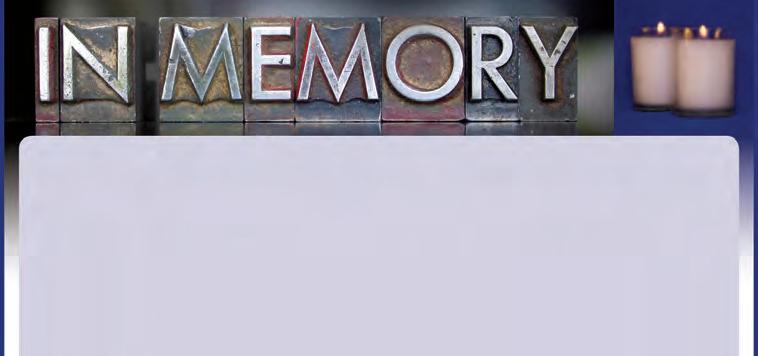
Edris Weis
MILLER: Arnold Miller, age 83, passed away peacefully on June 3, 2025, at the house he called home since 1946. His beloved wife (Joanne) of 61 years, whom he met as a teenager, was by his side. Arnie graduated from Taylor Allderdice High School, the University of Pennsylvania Wharton School, and earned a Ph.D. in political science from the University of Pittsburgh. He was the brother of Fred and son of the late Leon and Anne Singer Miller. Arnie had two careers. He was assistant professor of political science and first assistant director of the University Center of International Studies at the University of Pittsburgh. During his tenure he was awarded a Fullbright Fellowship to teach political science in the Department of Law at the University of Groningen in the Netherlands. Subsequently, for the next 30 years he was co-owner of Leon Miller & Company, a manufacturer of better jewelry which serviced retail jewelry stores. For many years he exhibited at the Jeweler’s National Show in Las Vegas, and was awarded Salesman of the Year. Arnie was honored with Mentor of the Year award for his volunteer work with vulnerable students. His daughter describes him as “the nicest, kindest person I knew, my hero.” One of his sons remarked, “He taught me everything he knew, how to be a parent and how to be a husband.” All of his children learned that anything is possible if you believe in yourself. Following Arnie’s 2003 retirement, he and Joanne traveled the world. They particularly loved the past 16 autumns they spent in the south of France. Arnie
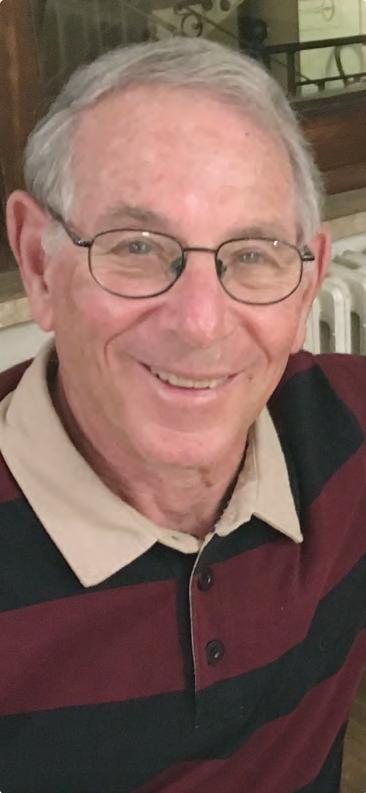
Contact the Development department at 412-586-2690 or development@jaapgh.org for more information. THIS WEEK’S YAHRZEITS —
Sunday June 15: Sylvia Barmen, Barney B Dobkin, Stanley Flansbaum, Belle Goldman, Saul Goldstein, Fanny Kurfeerst, Jacob Landay, Max H Leib, Esther Littman, Joseph Morantz, Max R Morgan, Geraldine Sadowsky, Jennie Santman, Margery L Selkovits, Helen P Suttin, Bertha Weisberger
Monday June 16: Casper Alman, Dr Fredrick Amshel, Leah Bloom, Louis Bowytz, Mary Segal Eger, Sadye Klee Gardner, Oscar Green, Sarah Haltman, Rae Kreger Hepps, Rose Kramer, Jack Kenneth Kruman, Shirley F Levenson, Joseph Pickholtz, Hyman Shapiro, Mollie Silverblatt
Tuesday June 17: Edith S Adler, Sarah Bass, Benjamin Block, Dr Mortimer Cohen, Usher Z Cohen, William Congress, Suzanne Dolgin, Hyman Elovitz, Louis Fienberg, Ida Leah Hurwick, Cheri Glick Jak, Dorothy Levine, Jessie Levine, Fannie Lipsich, Dr Theodore Lundy, Dorothy Glickman Mandelblatt, Erwin Lawrence Rubenstein
Wednesday June 18: Hyman Berkowitz, David J Cohen, Lawrence Stephen Fisher, Ada Gilles Frank, Herbert S Goodman, Rae Horovitz, Milton Klein, Rebecca Leff, Sarah Mollie Lewis, Louis Meyers, Harold Middleman, Abraham N Miller, Rose Morgan, Molly Moskovitz, Rae Rader, Harry Recht, Ben Sussman, David Howard Weis
Thursday June 19: Rachel Americus, Isadore Becker, Clara Bluestone, Florence Fredericks, Esther Lang Glick, Julius Goldberg, Rose Goldstein, Fannie Goltz, Goldie Graff, Rose Azen Horewitz, David Rosenfield, Libby Silberblatt, Rae Solomon, Phillip Weiss, Morris Zinman
Friday June 20: Howard J Friedman, Benjamin Horne, Julie Katzman, Minnie Reich, Ida S Segal, Nathan Shaer, Ethel Silver, Irene Feldman Weiss
Saturday June 21: Nathan Baum, Frank Bennett, Della B Berman, Marine Private Alan Bernstein, Sarah Bernice Fine, Judith Friedberg, Ike Friedken, Ida S Frieman, Samuel Gordon, Milton Samuel Horowitz, Evelyn Letwin, Morris I Lieberman, Isaac Lincoff, Janet Gutkowska Mirow, Sara Pollack, Barney Snyder, Eva Coon Solomon, Bertha Weinberg









































Obituaries:
Continued from page 19
was a wonderful, gentle soul who was caring of everyone he met. He enjoyed running, tennis, long distance biking, Beaujolais wine and hiking the sentiers of southern France. His joys included playing flute-piano duets with his granddaughter Alia and writing poems for all occasions. Until his health deteriorated, for many years he was an active docent at Pittsburgh History & Landmarks Foundation giving frequent tours of Pittsburgh, the city he loved. In addition to his wife, he leaves behind his children, Bobby (Lori) and Aaron (Christine) of Chicago and Lisa Dalachinsky (Phil) of Plantation, Florida, as well as four beautiful grandchildren, Maya, Avery, Tanner and Alia. There will be a void in the lives of all who knew him. He will be missed by his family forever. Contributions in Arnie’s memory can be made to Pittsburgh History & Landmarks Foundation-Tour Program, c/o Mary Lu Denny, 100 West Station Square Drive, Suite 450, Pittsburgh, PA 15219-1134. Professional services trusted to D’Alessandro Funeral Home & Crematory Ltd; Lawrenceville. dalessandroltd.com
SOLOMON: Lois Lipman Solomon: It is with heavy hearts and gratitude for a life well lived, that we announce the passing of our beloved Lois Lipman Solomon at home, at the age of 94. Lois was predeceased by her parents, Ella Farber Lipman and William Lipman, her brother Norris Lipman, her beloved husband Raoul Benjamin Solomon, her cherished son Robert Charles Solomon, her beloved partner Leonard Frank, and her sister-in-law Emily Solomon Mendelson. She leaves behind her daughters Wendy Solomon and Amy Solomon. In the last few months, Lois received much kindness from her caregivers, Janet Brunson and Kenya Turner, and the Bridge’s Hospice Staff. She was born and raised in Greensburg, and graduated with a degree in English from Pitt. Known for her fierce devotion to family, she was a gracious host for countless holiday dinners in her warm and welcoming home. Lois always
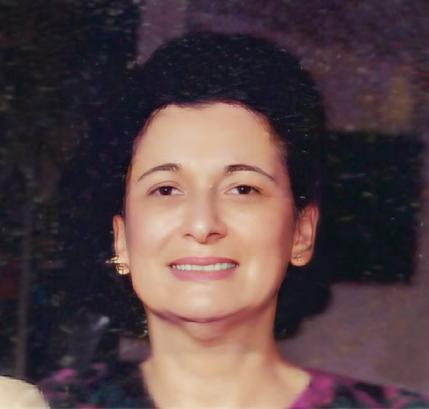
made time to listen and laugh with friends, especially at her weekly bridge games. Her Jewish faith was an anchor in her life. She volunteered weekly at the Biblical Botanical Garden at Rodef Shalom Congregation. Lois’ passion for the performing arts also enriched our lives, from escorting her daughters to Playhouse Junior to season tickets at the Pittsburgh Symphony, Opera and traveling Broadway shows. Her favorite vacations were traveling to New York to see as many Broadway shows as the weekend would allow. May her soul be at peace and her memory a blessing. Services and interment private. Tribute donations may be made to the Humane Animal Rescue of Pittsburgh (HARP, humaneanimalrescue.org/donate) or the charity of your choice. Arrangements entrusted to Ralph Schugar Chapel, Inc. schugar.com
WINTNER: Lisa K.(Favish) Wintner, age 73, of Mt. Lebanon, on Sunday June 8, 2025. Beloved wife of Dr. Morton S. Wintner. Beloved mother of Amy (Evan) Pollack. Cherished grandmother of Logan Pollack. Lisa was a wonderful and loving wife, companion, mother and grandmother. She was a former reporter with WWVA Radio Wheeling, West Virginia. She worked as a marketing specialist for two architectural firms, and an environmental services company. Services were held at William Slater II Funeral Service, 1650 Greentree Rd., Scott Twp., 15220 (412-563-2800). Interment at Mt. Lebanon Cemetery. Lisa was an avid animal lover. Please send contributions to Animal Friends, 562 Camp Horne Rd, Pittsburgh, PA 15237, thinkingoutsidethecage.org. PJC
This is one in a series of articles about Elder Law by Michael H. Marks., Esq.
Michael H. Marks is an elder law attorney with offices in Squirrel Hill and Allison Park. Send questions to michael@marks-law.com or visit www.marks-law.com.
A loved one who has died, might often leave behind tangible personal property - personal effects, furnishings, etc. - their “stuff.” Such belongings offer both complications and opportunities in winding up their affairs.
For property that has its title and ownership registered somewhere, like real estate, bank accounts, investments, or even vehicles, selling or transferring ownership requires paperwork and documentation, and action by someone who has the legal authority to do so.
But furniture, clothing, mementos, photographs, heirlooms, and other “stuff” ordinarily do not have any title or ownership records recorded downtown or in Harrisburg. For the Eexecutor or my family to sell my sofa, all they have to do is make a deal, and all the buyer has to do is to carry it away. No paperwork is ordinarily necessary.
Legally and technically, because there’s no named beneficiary or registered title, the dining set and vacuum are considered part of the probate estate and pass according to the will (or if no will, then under Pennsylvania laws of inheritance).
That makes it easier to deal with such property, with less official rigmarole – but also easier to MIS-handle such property. Someone who does
not have actual legal authority to do so, can make off with the goods. I’ve heard so many times from clients who complained that others who were not entitled have gone into the house and taken tangible personal property.
Unlike something I own with someone else as a joint owner with right of survivorship or with a beneficiary named to inherit automatically, most of the time someone’s “stuff” is handled casually and informally, by consensus and agreement among the family or other participants. When beneficiaries are going to argue and fight, family heirlooms and even ordinary junky object are the one thing that they are likely to fight over. Such things may have no monetary value but still carry tremendous sentimental value. Think of, for example, dad’s baseball mitt or fishing rods, or mom’s jewelry.
There are only a few things you can do with the contents of somebody’s home and their tangible personal property: distribute it to whoever wants it; sell it; donate it to whoever will take it; or dispose of the rest. It’s sad when all the belongings of someone’s entire lifetime must be simply discarded but it happens every day. A common example of something that was loved and cherished but often no longer has any sale value is a set of beautiful china.
It can be hard generally to sell someone’s tangible personal property. There often has to be a lot of value for an estate sale company to be interested. For PA inheritance tax purposes, I usually consider the contents of someone’s home to be of no cash value, unless there actually was an estate sale, or anything is sold and actually turned into cash.
Next, I’m writing with exciting news and heartfelt appreciation.
Beginning June 1, 2025, I will have joined Attorney Jay R. Hagerman at the law firm of Abernethy and Hagerman, LLC, in Allison Park on Rt. 8.
This change reflects a shared commitment to compassionate and effective elder law services. I believe this move will benefit you and your loved ones. Thank you for entrusting your legal work to me now, in the past and in the future. I appreciate the opportunity to assist you.
My new firm does the same kind of work that I do now. Attorney Jay Hagerman and his team are friendly and extremely accomplished (Abernathy is retired.) This move will assure continuity and greater service to my clients.
The new office is on Rt 8 in Allison Park, about a 25 minute drive from the present office. I’ll be there daily, BUT the Murray

Avenue office will stay open part time, by appointment, through September 30, to help transition nearby clients. And as always, I’ll also still gladly make house calls and come to see you when needed.
You will still be able to reach me at the same phone number, 412-421-8944 and email address, michael@marks-law.com, OR at the new firm phone number, 412-486-6624 or email address mhm@a-hlaw.com.
Abernethy and Hagerman is a trusted elder law firm that I’ve long admired, and Jay shares my approach to client service. While I’ll continue managing open cases personally, the team and resources at Abernethy Hagerman will allow us to better serve you and future clients.
We’ve helped a LOT of people, and I’m grateful to each of you. Let me know how I can help you going forward in any way. This is just the start of a new chapter. Thank you for your continued trust.
4927 William Flinn Hwy • Allison Park, Pennsylvania 15101 412-421-8944 • 412-486-6624 marks@marks-law.com * mhm@ahlaw.com

Contact me today to discuss all of your real estate needs!
Sherri Mayer, Realtor Squirrel Hill Office C: 412-760-0412 O: 412-421-9121x225 sherrimayer@howardhanna.com HowardHanna.com





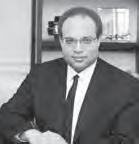


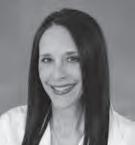


Smith-Rosenthal Team
Jason A. Smith & Caryn Rosenthal
Jason: 412-969-2930 | Caryn: 412-389-1695 Jasonasmith@howardhanna.com Carynrosenthal@howardhanna.com

Baum Blvd. Pittsburgh PA 15232
Office | 412-361-4000


pittsburghjewishchronicle.org








We at the Pittsburgh Jewish Chronicle are working hard to continue to make our publication even more relevant to your needs, and your feedback is important to us. Could you please spare a few minutes to take a brief survey? It shou Id take no more than 5-8 minutes to complete. Your input will help us ensure that during these challenging times the Chronicle continues to serve you and our community in meaningful ways. In appreciation of your help, you will be eligible to enter a drawing for a $100 Giant Eagle gift card. Visit https://survey.zohopublic.com/zs/jQD9gb to let us know what you think. Or scan this QR code:







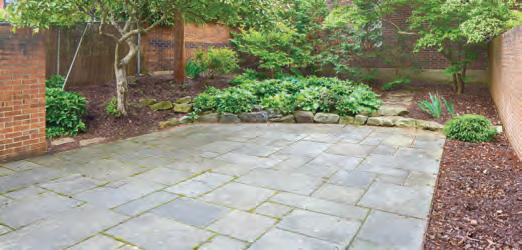

By Adam Reinherz | Senior Staff Writer
An upcoming event is encouraging young adults to create in-person community and support the Jewish state. Slated for June 20, Shabbat Social is an opportunity to celebrate Zionism and “our connection to Israel,” according to organizers.
Beth Vander Stoep, assistant director of the Jewish Federation of Greater Pittsburgh’s Jewish Community Relations Council, said she and colleague Moshe Luzer planned the event in an effort to “combat antisemitism with radical Jewish joy.”
Through conversations with Pittsburghers aged 20-40 Vander Stoep noticed an “incredible feeling of isolation,” she said. Individuals repeatedly conveyed, “I’m Jewish. I’m a Zionist and I feel so alone in my workplace or in my friend groups.”
Recognizing the difficulties many people are having “professionally, emotionally and socially, we decided to have our young adult Jewish community come together and have a joyful conversation about what it means to be a Zionist and to have a connection to Israel,” she said.
The upcoming program, which requires a reservation and runs from 6-7:30 p.m. at the Jewish Community Center in Squirrel Hill, will include hors d’oeuvres, Israeli wine, space to speak and an opportunity to hear from Amy Albertson, a California native
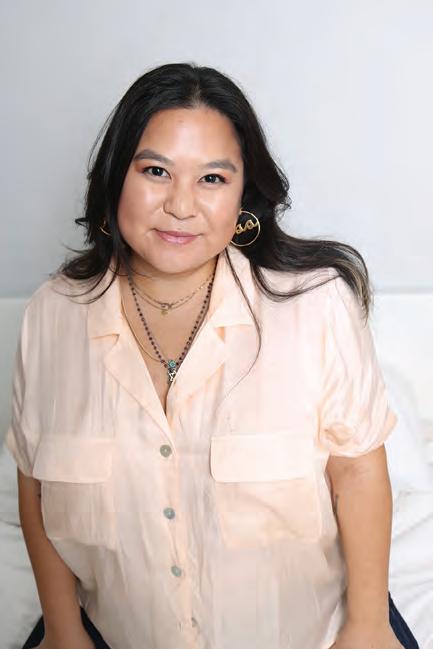
Through her social media posts and speaking engagements, Albertson often references her identity as a ChineseAmerican Jewish woman.
“I come from a pretty, what I guess we would call, an atypical Jewish upbringing and background and a mixed family,” she said. Albertson explored her heritage and connection to Judaism and the Jewish state during a six-year stint living in Israel, where she posted content as “The Asian Israeli.” Whereas most of her current advocacy
concerns Jewish diversity and pluralism, she said she’s also focused on helping “reclaim” a certain buzzword.
“We always hear that ‘Zionism is racism,’ ‘Zionism’ is white supremacy’ and that Zionism means oppression or occupation of Arabs, or things like this,” she said. “None of that is true. Zionism comes from our ancient texts and our history. It was reinvigorated in the modern Zionist movement to create the modern state of Israel, but it was always centered on Jewish people, on us reclaiming our homeland. It’s centered on us being sovereign. There’s no official policies of Zionism or tenants of Zionism that are about oppressing someone else or committing violence against someone else.”
Albertson, who was named by Hadassah Magazine in 2023 as one of “18 American Zionist Women You Should Know,” said it’s important to not only post about these matters but address them in person.
“So many of the most impactful conversations and interactions are happening in person and even on a smaller scale, even one to one,” she said. “Speaking out on social media is great, but remember those in-person interactions.”
Researchers repeatedly underscore the primacy of in-person communication.
“Due to its intrusiveness, the smartphone reduces the quality of face-to-face interactions and, as a consequence, their positive impact on well-being,” Journal of Economic Psychology reported.
Similarly, in sharing findings from a
four-week pandemic lockdown period, Nature noted several problems that arise when in-person communication is eschewed.
“Digital communication may not activate the largely subconscious, neurophysiological tools which have evolved in order to help humans determine who is friend and who is foe,” researchers said. Regarding depersonalization and other unfavorable outcomes, “research and anecdotal reports show that videoconferencing can cause adverse effects such as mental tiredness; anxiety due to a focus on appearance, prolonged eye contact, larger faces due to screen size and the perceived dominance of a communication partner due to low camera position; and cognitive burden due to the slight technological asynchrony of video calls.”
Albertson is hoping to maximize her in-person engagements in Pittsburgh.
“It’s always really important for me to connect directly with communities,” she said. “As much as the messages are universal, delivering them I think should always be very personal.”
The goal of Shabbat Social is to create a large social event for young adult Jews in Pittsburgh, Federation staffer and event co-organizer Luzer said. “This is an opportunity to meet new people, hang out with friends, embrace and be a part of the community we are building here. We need to get everyone together.” PJC
Adam Reinherz can be reached at areinherz@pittsburghjewishchronicle.org.

Day at the park
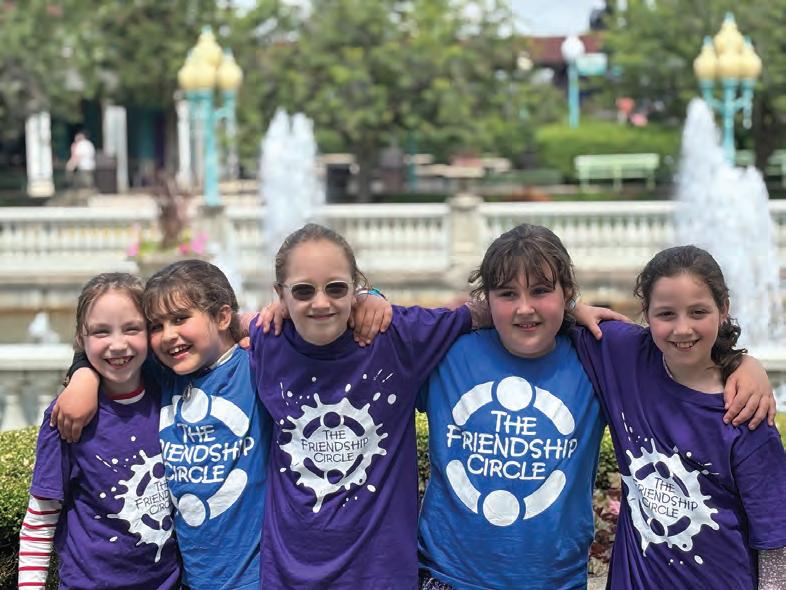
The Friendship Circle of Pittsburgh hosted its annual Kennywood Day. The June 8 event

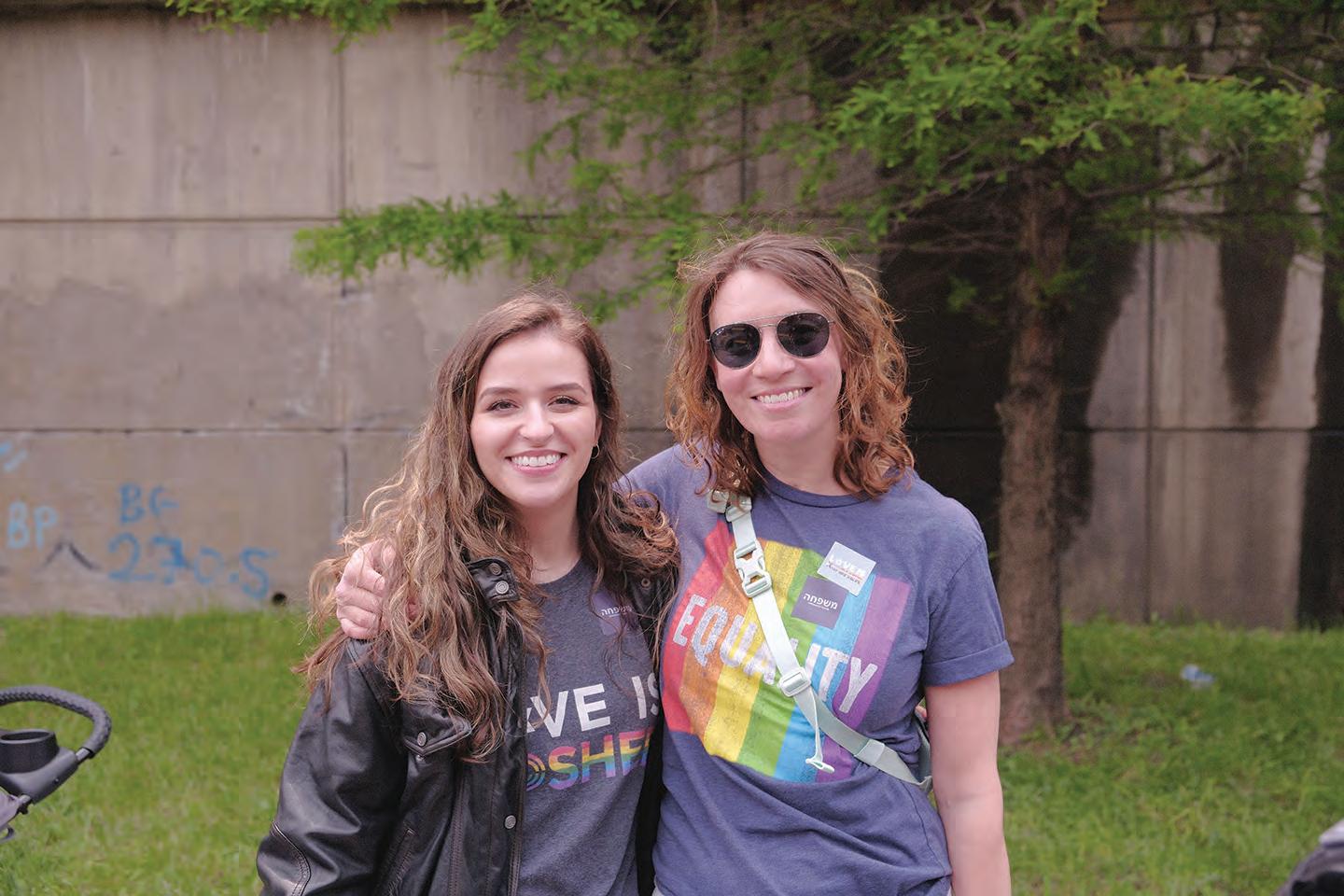
Scintillating science
Hillel Academy of Pittsburgh welcomed parents and community members to STEMFEST 2025. The May 14 program featured science, technology, engineering and math projects
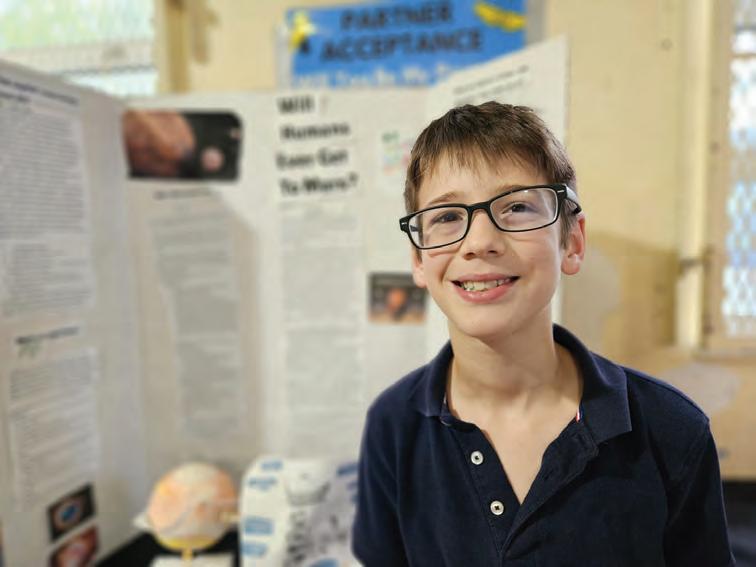
Heartful gathering

Major General (Res.) Doron Almog, chairman of the executive of The Jewish Agency for Israel and recipient of the Israel Prize, joined the Jewish Federation of Greater Pittsburgh’s Heart of Philanthropy event. The June 5 event thanked major donors and Lev Society members for their contributions.
